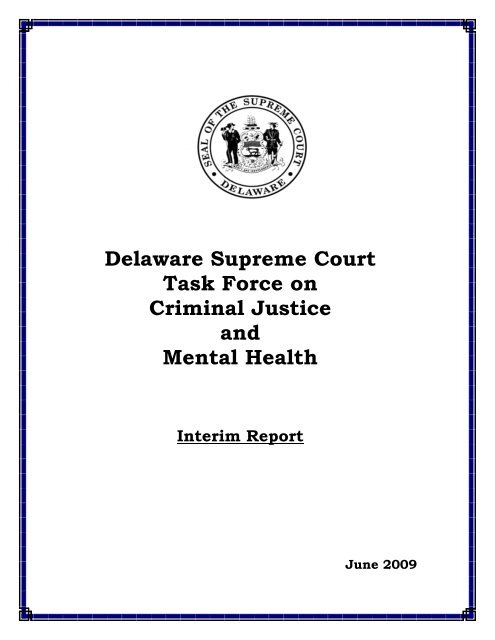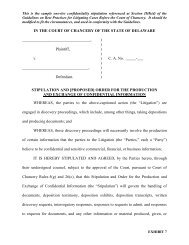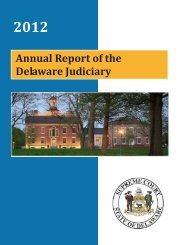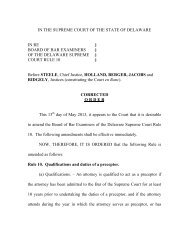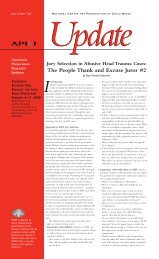Delaware Supreme Court Task Force on Criminal Justice and ...
Delaware Supreme Court Task Force on Criminal Justice and ...
Delaware Supreme Court Task Force on Criminal Justice and ...
- No tags were found...
Create successful ePaper yourself
Turn your PDF publications into a flip-book with our unique Google optimized e-Paper software.
Table of C<strong>on</strong>tentsI. Introducti<strong>on</strong>Importance of Addressing <strong>Criminal</strong> <strong>Justice</strong> Involved Individuals with MentalIllnesses……………………………………………………………………1Creati<strong>on</strong> of the <str<strong>on</strong>g>Delaware</str<strong>on</strong>g> <str<strong>on</strong>g>Supreme</str<strong>on</strong>g> <str<strong>on</strong>g>Court</str<strong>on</strong>g> <str<strong>on</strong>g>Task</str<strong>on</strong>g> <str<strong>on</strong>g>Force</str<strong>on</strong>g> <strong>on</strong> <strong>Criminal</strong> <strong>Justice</strong> <strong>and</strong>Mental Health……………………………………………………………...2Goals of the <str<strong>on</strong>g>Task</str<strong>on</strong>g> <str<strong>on</strong>g>Force</str<strong>on</strong>g> …………………………………………………………..2Funding……………………………………………………………………………3II.III.IV.Charge of the <str<strong>on</strong>g>Task</str<strong>on</strong>g> <str<strong>on</strong>g>Force</str<strong>on</strong>g>……………………………………..……………3<str<strong>on</strong>g>Task</str<strong>on</strong>g> <str<strong>on</strong>g>Force</str<strong>on</strong>g> Membership…….………………………………………………4Subcommittees………………...………………………………………………6V. Current <str<strong>on</strong>g>Task</str<strong>on</strong>g> <str<strong>on</strong>g>Force</str<strong>on</strong>g> ProjectsMeetings………………………………………………………………………..….6<strong>Justice</strong> Leadership Initiative (JLI) Policy Forum………………………………….7Tours of Department of Correcti<strong>on</strong> Treatment Facilities…………………………7Judicial <strong>and</strong> Public Educati<strong>on</strong>……………………………………………………..7Expansi<strong>on</strong> of Mental Health <str<strong>on</strong>g>Court</str<strong>on</strong>g>s……………………………………………….8Attorney General Opini<strong>on</strong> <strong>on</strong> HIPAA…………………………………………….9Involuntary Commitments……………………………………………………….10Review of Department of Correcti<strong>on</strong> Formulary………………………………...11Collaborati<strong>on</strong> with Governor’s Reentry <str<strong>on</strong>g>Task</str<strong>on</strong>g> <str<strong>on</strong>g>Force</str<strong>on</strong>g>……………………………..11Technical Assistance: <str<strong>on</strong>g>Delaware</str<strong>on</strong>g> <strong>Criminal</strong> <strong>Justice</strong> <strong>and</strong> Mental Health Informati<strong>on</strong>Sharing Project…………………………………………………….……..12Research Assistance: University of <str<strong>on</strong>g>Delaware</str<strong>on</strong>g>…………………………………...13VI.Preliminary Recommendati<strong>on</strong>s……………………………...…………..15VII. C<strong>on</strong>clusi<strong>on</strong>……………………………………………………….……………18VIII. AppendixMinutes of <str<strong>on</strong>g>Task</str<strong>on</strong>g> <str<strong>on</strong>g>Force</str<strong>on</strong>g> Meetings……………………………………………….A-1Request for Attorney General’s Opini<strong>on</strong> <strong>on</strong> HIPAA………………………….A-24Articles <strong>and</strong> Press Releases…………………………………………………...A-26
I. Introducti<strong>on</strong>Importance of Addressing <strong>Criminal</strong> <strong>Justice</strong> Involved Individuals with Mental IllnessesThe frequency with which people with mental illnesses enter our criminal justicesystem <strong>and</strong> their h<strong>and</strong>ling within that system are critical issues across the nati<strong>on</strong> <strong>and</strong> in<str<strong>on</strong>g>Delaware</str<strong>on</strong>g>. Nati<strong>on</strong>al statistics show that 24% of state pris<strong>on</strong>ers had received a clinicaldiagnosis or treatment by a mental health professi<strong>on</strong>al within the past 12 m<strong>on</strong>ths. Whenpris<strong>on</strong>ers with symptoms of a mental disorder were also included, statistics show that56% of state pris<strong>on</strong>ers had a mental health problem. 1 In <str<strong>on</strong>g>Delaware</str<strong>on</strong>g>, high rates of mentalillness am<strong>on</strong>g pris<strong>on</strong>ers have exacerbated problems in the treatment of pris<strong>on</strong>ers withmental illnesses in the correcti<strong>on</strong>s system as highlighted in an investigati<strong>on</strong> of <str<strong>on</strong>g>Delaware</str<strong>on</strong>g>’scorrecti<strong>on</strong>s system undertaken by the Civil Rights Divisi<strong>on</strong> of the United StatesDepartment of <strong>Justice</strong>. While remedial acti<strong>on</strong>s are being undertaken by the correcti<strong>on</strong>ssystem, many of those with mental illnesses would be better treated by diversi<strong>on</strong>, ratherthan being incarcerated, especially since slightly over half (51%) of state pris<strong>on</strong> inmateswith mental health problems were incarcerated for n<strong>on</strong>-violent offenses. 2Recognizing this problem, <str<strong>on</strong>g>Delaware</str<strong>on</strong>g> has made substantial efforts to divert thosewith mental illnesses from the criminal justice system. New initiatives – including theestablishment of several pilot mental health courts in New Castle County, as well as newefforts regarding police training <strong>on</strong> h<strong>and</strong>ling those with mental illnesses – dem<strong>on</strong>stratethe State’s commitment to addressing these issues <strong>and</strong> provide hope for improving thetreatment of the mentally ill within the criminal justice system, but much more remains tobe d<strong>on</strong>e.1 U.S. Department of <strong>Justice</strong>, Bureau of <strong>Justice</strong> Statistics, Mental Health Problems of Pris<strong>on</strong> <strong>and</strong> JailInmates (September 2006).2 Ibid.1
Creati<strong>on</strong> of the <str<strong>on</strong>g>Delaware</str<strong>on</strong>g> <str<strong>on</strong>g>Supreme</str<strong>on</strong>g> <str<strong>on</strong>g>Court</str<strong>on</strong>g> <str<strong>on</strong>g>Task</str<strong>on</strong>g> <str<strong>on</strong>g>Force</str<strong>on</strong>g> <strong>on</strong> <strong>Criminal</strong> <strong>Justice</strong> <strong>and</strong> MentalHealthIn an effort to better underst<strong>and</strong> <strong>and</strong> address the issue of criminal justice involvedindividuals with mental illnesses, the <str<strong>on</strong>g>Delaware</str<strong>on</strong>g> <str<strong>on</strong>g>Supreme</str<strong>on</strong>g> <str<strong>on</strong>g>Court</str<strong>on</strong>g> is participating in theChief <strong>Justice</strong>s’ <strong>Criminal</strong> <strong>Justice</strong>/Mental Health Leadership Initiative, a nati<strong>on</strong>al project inits sec<strong>on</strong>d year. In 2008, <str<strong>on</strong>g>Delaware</str<strong>on</strong>g> was <strong>on</strong>e of <strong>on</strong>ly four states selected by the Council ofState Governments (CSG) <strong>Justice</strong> Center to participate, <strong>and</strong> as <strong>on</strong>e of the states selected,<str<strong>on</strong>g>Delaware</str<strong>on</strong>g> will receive funding <strong>and</strong> technical assistance from the CSG <strong>Justice</strong> Center <strong>and</strong>Nati<strong>on</strong>al GAINS Center.To lead <str<strong>on</strong>g>Delaware</str<strong>on</strong>g>’s efforts, Chief <strong>Justice</strong> Myr<strong>on</strong> T. Steele formed the <str<strong>on</strong>g>Delaware</str<strong>on</strong>g><str<strong>on</strong>g>Supreme</str<strong>on</strong>g> <str<strong>on</strong>g>Court</str<strong>on</strong>g> <str<strong>on</strong>g>Task</str<strong>on</strong>g> <str<strong>on</strong>g>Force</str<strong>on</strong>g> <strong>on</strong> <strong>Criminal</strong> <strong>Justice</strong> <strong>and</strong> Mental Health <strong>and</strong> has designated<str<strong>on</strong>g>Delaware</str<strong>on</strong>g> <str<strong>on</strong>g>Supreme</str<strong>on</strong>g> <str<strong>on</strong>g>Court</str<strong>on</strong>g> <strong>Justice</strong> Henry duP<strong>on</strong>t Ridgely as chair of the project.Goals of the <str<strong>on</strong>g>Task</str<strong>on</strong>g> <str<strong>on</strong>g>Force</str<strong>on</strong>g>Under <strong>Justice</strong> Ridgely’s leadership, the <str<strong>on</strong>g>Task</str<strong>on</strong>g> <str<strong>on</strong>g>Force</str<strong>on</strong>g> has brought together judges,state leaders, legislators <strong>and</strong> n<strong>on</strong>profit organizati<strong>on</strong>s to develop ways to improveoutcomes for people with mental illnesses engaged with the criminal justice system. Thegoals of the <str<strong>on</strong>g>Task</str<strong>on</strong>g> <str<strong>on</strong>g>Force</str<strong>on</strong>g> are to encourage inter-agency co-operati<strong>on</strong>, <strong>and</strong> identify specificgaps in resources, including improvements to treatment opti<strong>on</strong>s, as well as steps to takewhen appropriate, to help individuals with mental illnesses avoid c<strong>on</strong>tact with thecriminal justice system. In 2009, the <str<strong>on</strong>g>Task</str<strong>on</strong>g> <str<strong>on</strong>g>Force</str<strong>on</strong>g> will develop a strategic plan to addressthese issues.2
FundingThe work of the <str<strong>on</strong>g>Task</str<strong>on</strong>g> <str<strong>on</strong>g>Force</str<strong>on</strong>g> is supported by a $5,000 grant from the Council ofState Governments <strong>Justice</strong> Center. The <str<strong>on</strong>g>Task</str<strong>on</strong>g> <str<strong>on</strong>g>Force</str<strong>on</strong>g> will also receive technical assistancefrom the CSG <strong>Justice</strong> Center, the Nati<strong>on</strong>al GAINS Center, <strong>and</strong> nati<strong>on</strong>ally recognizedexperts in the areas of criminal justice <strong>and</strong> mental health.II. Charge of the <str<strong>on</strong>g>Task</str<strong>on</strong>g> <str<strong>on</strong>g>Force</str<strong>on</strong>g>The charge of the <str<strong>on</strong>g>Delaware</str<strong>on</strong>g> <str<strong>on</strong>g>Supreme</str<strong>on</strong>g> <str<strong>on</strong>g>Court</str<strong>on</strong>g> <str<strong>on</strong>g>Task</str<strong>on</strong>g> <str<strong>on</strong>g>Force</str<strong>on</strong>g> <strong>on</strong> <strong>Criminal</strong> <strong>Justice</strong> <strong>and</strong>Mental Health is to develop recommendati<strong>on</strong>s to policymakers to improve preventi<strong>on</strong> <strong>and</strong>system-wide resp<strong>on</strong>ses to pers<strong>on</strong>s with mental illness involved in the entry into thecriminal justice system or re-entry into the community through inter-branchcommunicati<strong>on</strong>, collaborati<strong>on</strong> <strong>and</strong> allocati<strong>on</strong> of resources for the educati<strong>on</strong> of thecriminal justice community, the identificati<strong>on</strong> of juvenile <strong>and</strong> adult defendants in need ofmental health treatment, the enhancement of victim’s rights <strong>and</strong> the referral, whenappropriate, of defendants with mental illness to mental health courts established in eachcounty for judicially supervised community-based treatment.3
III. <str<strong>on</strong>g>Task</str<strong>on</strong>g> <str<strong>on</strong>g>Force</str<strong>on</strong>g> MembershipChief <strong>Justice</strong> Myr<strong>on</strong> T. Steele appointed <strong>Justice</strong> Henry duP<strong>on</strong>t Ridgely of the<str<strong>on</strong>g>Delaware</str<strong>on</strong>g> <str<strong>on</strong>g>Supreme</str<strong>on</strong>g> <str<strong>on</strong>g>Court</str<strong>on</strong>g> to chair the <str<strong>on</strong>g>Task</str<strong>on</strong>g> <str<strong>on</strong>g>Force</str<strong>on</strong>g>. Other members of the <str<strong>on</strong>g>Task</str<strong>on</strong>g> <str<strong>on</strong>g>Force</str<strong>on</strong>g> are:JUDICIAL BRANCHH<strong>on</strong>. Jan R. JurdenJudge, Superior <str<strong>on</strong>g>Court</str<strong>on</strong>g> of <str<strong>on</strong>g>Delaware</str<strong>on</strong>g>H<strong>on</strong>. Joseph F. Flickinger, IIIJudge, <str<strong>on</strong>g>Delaware</str<strong>on</strong>g> <str<strong>on</strong>g>Court</str<strong>on</strong>g> of Comm<strong>on</strong> PleasH<strong>on</strong>. Andrea Maybee FreudCommissi<strong>on</strong>er, Superior <str<strong>on</strong>g>Court</str<strong>on</strong>g> of <str<strong>on</strong>g>Delaware</str<strong>on</strong>g>H<strong>on</strong>. Alicia B. HowardCommissi<strong>on</strong>er, Superior <str<strong>on</strong>g>Court</str<strong>on</strong>g> of <str<strong>on</strong>g>Delaware</str<strong>on</strong>g>H<strong>on</strong>. Loretta M. YoungCommissi<strong>on</strong>er, Family <str<strong>on</strong>g>Court</str<strong>on</strong>g> of <str<strong>on</strong>g>Delaware</str<strong>on</strong>g>H<strong>on</strong>. Deborah Ann McNesby<strong>Justice</strong> of the Peace, <strong>Justice</strong> of the Peace <str<strong>on</strong>g>Court</str<strong>on</strong>g>LEGISLATIVE BRANCH<str<strong>on</strong>g>Delaware</str<strong>on</strong>g> SenateH<strong>on</strong>. Margaret Rose HenryH<strong>on</strong>. Liane M. Sorens<strong>on</strong><str<strong>on</strong>g>Delaware</str<strong>on</strong>g> House of RepresentativesH<strong>on</strong>. Deborah Huds<strong>on</strong>H<strong>on</strong>. Helene M. KeeleyEXECUTIVE BRANCH<str<strong>on</strong>g>Delaware</str<strong>on</strong>g> Board of ParoleDwight F. Holden, Chairpers<strong>on</strong><str<strong>on</strong>g>Delaware</str<strong>on</strong>g> Health <strong>and</strong> Social ServicesH<strong>on</strong>. Rita L<strong>and</strong>graf, Cabinet SecretaryKevin Huckshorn, RN, MSN, CAP, ICADC, Director, Divisi<strong>on</strong> of SubstanceAbuse <strong>and</strong> Mental HealthSusan McLaughlin, Director, Treatment Access Center (TASC)4
Department of Correcti<strong>on</strong>Thomas Carroll, Deputy Commissi<strong>on</strong>erImad Jarwan, Treatment Services CoordinatorJeremy McEntire, Treatment Services AdministratorGeorgiana Staley, Senior Probati<strong>on</strong> OfficerDepartment of <strong>Justice</strong>H<strong>on</strong>. Richard S. Gebelein, Chief DeputyDepartment of Safety <strong>and</strong> Homel<strong>and</strong> SecurityTerry L. Pepper, Deputy Principal AssistantDepartment of Services for Children, Youth, <strong>and</strong> Their FamiliesH<strong>on</strong>. Vivian Rapposelli, Cabinet SecretarySusan A. Cycyk, M.Ed., Director, Divisi<strong>on</strong> of Child Mental Health ServicesOffice of the Public DefenderBrian J. Bartley, Esq. Chief DeputyKerry M. Ferriter, Supervisor, Psycho-Forensic Evaluati<strong>on</strong> UnitDawn M. Williams, Esq., Assistant Public DefenderCOMMUNITY TASK FORCE MEMBERSDr. Janet Kramer, Board Chair, <str<strong>on</strong>g>Delaware</str<strong>on</strong>g> Center for <strong>Justice</strong>James Lafferty, Director, Mental Health Associati<strong>on</strong> in <str<strong>on</strong>g>Delaware</str<strong>on</strong>g> (MHA)Patricia McDowell, Director of Programs, Nati<strong>on</strong>al Alliance <strong>on</strong> Mental Illness in<str<strong>on</strong>g>Delaware</str<strong>on</strong>g> (NAMI)Dr. Carol A. Tavani, MD, MS, DFAPA, Psychiatric Services, Christiana CareMental Health UnitADVISORY SUBCOMMITTEE MEMBERSR<strong>on</strong>ald Keen, <strong>Criminal</strong> <strong>Justice</strong> Senior Planner, <strong>Criminal</strong> <strong>Justice</strong> CouncilChristian Kervick, <strong>Criminal</strong> <strong>Justice</strong> Planning Coordinator, <strong>Criminal</strong> <strong>Justice</strong>CouncilDr. Chrysanthi Le<strong>on</strong>, Assistant Professor of Sociology, University of <str<strong>on</strong>g>Delaware</str<strong>on</strong>g>Patricia Dailey Lewis, Director of Family Divisi<strong>on</strong>, Department of <strong>Justice</strong>Dr. Clarence Wats<strong>on</strong>, Psychiatrist, <str<strong>on</strong>g>Delaware</str<strong>on</strong>g> Psychiatric CenterTASK FORCE STAFFH<strong>on</strong>. Patricia W. Griffin, State <str<strong>on</strong>g>Court</str<strong>on</strong>g> AdministratorChristine Sudell, Esq., Deputy State <str<strong>on</strong>g>Court</str<strong>on</strong>g> AdministratorStephanie Sym<strong>on</strong>s, Esq., Staff Attorney, Administrative Office of the <str<strong>on</strong>g>Court</str<strong>on</strong>g>s5
IV. SubcommitteesThe <str<strong>on</strong>g>Task</str<strong>on</strong>g> <str<strong>on</strong>g>Force</str<strong>on</strong>g> has established the following subcommittees.Eachsubcommittee has been tasked with addressing specific areas of c<strong>on</strong>cern related tocriminal justice involved individuals with mental illnesses <strong>and</strong> with developing c<strong>on</strong>creteacti<strong>on</strong> plans to address those c<strong>on</strong>cerns. Subcommittees meet regularly <strong>and</strong> report back tothe <str<strong>on</strong>g>Task</str<strong>on</strong>g> <str<strong>on</strong>g>Force</str<strong>on</strong>g>.Communicati<strong>on</strong>, Collaborati<strong>on</strong>, <strong>and</strong> Resource Allocati<strong>on</strong> SubcommitteeChair: H<strong>on</strong>. Jan R. JurdenJudge, Superior <str<strong>on</strong>g>Court</str<strong>on</strong>g> of <str<strong>on</strong>g>Delaware</str<strong>on</strong>g>Educati<strong>on</strong>, Preventi<strong>on</strong>, <strong>and</strong> Victim’s Rights SubcommitteeChair: Dwight F. HoldenChairpers<strong>on</strong>. <str<strong>on</strong>g>Delaware</str<strong>on</strong>g> Board of ParoleIdentificati<strong>on</strong>, Assessment, <strong>and</strong> Treatment SubcommitteeChair: Dr. Carol A. Tavani, MD, MS, DFAPAPsychiatric Services, Christiana Care Mental Health UnitJuvenile SubcommitteeChair: H<strong>on</strong>. Jan R. JurdenJudge, Superior <str<strong>on</strong>g>Court</str<strong>on</strong>g> of <str<strong>on</strong>g>Delaware</str<strong>on</strong>g>Mental Health <str<strong>on</strong>g>Court</str<strong>on</strong>g>s SubcommitteeChair: H<strong>on</strong>. Joseph F. Flickinger, IIIJudge, <str<strong>on</strong>g>Delaware</str<strong>on</strong>g> <str<strong>on</strong>g>Court</str<strong>on</strong>g> of Comm<strong>on</strong> PleasV. Current <str<strong>on</strong>g>Task</str<strong>on</strong>g> <str<strong>on</strong>g>Force</str<strong>on</strong>g> ProjectsMeetingsThe <str<strong>on</strong>g>Task</str<strong>on</strong>g> <str<strong>on</strong>g>Force</str<strong>on</strong>g> held its first meeting <strong>on</strong> December 1, 2008. Additi<strong>on</strong>al meetingswere held <strong>on</strong> January 23, 2009, March 20, 2009, <strong>and</strong> May 8, 2009. Minutes of theDecember 1, 2008, January 23, 2009, <strong>and</strong> March 20, 2009 meetings are included in theappendix to this report. The <str<strong>on</strong>g>Task</str<strong>on</strong>g> <str<strong>on</strong>g>Force</str<strong>on</strong>g> will c<strong>on</strong>tinue to meet throughout 2009.6
<strong>Justice</strong> Leadership Initiative (JLI) Policy ForumOn January 8 <strong>and</strong> 9, 2009, <str<strong>on</strong>g>Task</str<strong>on</strong>g> <str<strong>on</strong>g>Force</str<strong>on</strong>g> members attended the JLI Policy Forum inPhiladelphia. Hosted by the CSG <strong>Justice</strong> Center <strong>and</strong> the Nati<strong>on</strong>al GAINS Center, thePolicy Forum brought together teams of judges, leaders of state agencies, <strong>and</strong> otherpractiti<strong>on</strong>ers from the four states selected to participate in the Chief <strong>Justice</strong>s’ <strong>Criminal</strong><strong>Justice</strong>/Mental Health Leadership Initiative: <str<strong>on</strong>g>Delaware</str<strong>on</strong>g>, Idaho, New Hampshire, <strong>and</strong>Wisc<strong>on</strong>sin. <str<strong>on</strong>g>Task</str<strong>on</strong>g> <str<strong>on</strong>g>Force</str<strong>on</strong>g> members shared informati<strong>on</strong> <strong>and</strong> learned from experts <strong>and</strong> judgeswho chaired similar task forces the previous year.Tours of Department of Correcti<strong>on</strong> Treatment FacilitiesOn April 27, 2009, <str<strong>on</strong>g>Task</str<strong>on</strong>g> <str<strong>on</strong>g>Force</str<strong>on</strong>g> members toured Howard R. Young Correcti<strong>on</strong>alInstituti<strong>on</strong> <strong>and</strong> Delores J. Baylor Women’s Correcti<strong>on</strong>al Instituti<strong>on</strong>. On May 19, 2009,<str<strong>on</strong>g>Task</str<strong>on</strong>g> <str<strong>on</strong>g>Force</str<strong>on</strong>g> members toured James T. Vaughn Correcti<strong>on</strong>al Center. <str<strong>on</strong>g>Task</str<strong>on</strong>g> <str<strong>on</strong>g>Force</str<strong>on</strong>g> membersreceived a guided tour of the special needs units that house <strong>and</strong> treat inmates with mentalillnesses as well as the medical <strong>and</strong> receiving areas at the instituti<strong>on</strong>s. <str<strong>on</strong>g>Task</str<strong>on</strong>g> <str<strong>on</strong>g>Force</str<strong>on</strong>g>members also met with Department of Correcti<strong>on</strong> <strong>and</strong> Correcti<strong>on</strong>al Medical Servicesstaff, <strong>and</strong> at Baylor, met <strong>and</strong> spoke with women housed in the facility’s special needsunit.Judicial <strong>and</strong> Public Educati<strong>on</strong>ArticlesThe <str<strong>on</strong>g>Task</str<strong>on</strong>g> <str<strong>on</strong>g>Force</str<strong>on</strong>g> recognizes the importance of educating the public as wellas the <str<strong>on</strong>g>Court</str<strong>on</strong>g>s <strong>and</strong> other agencies about the <str<strong>on</strong>g>Task</str<strong>on</strong>g> <str<strong>on</strong>g>Force</str<strong>on</strong>g>, existing programs such asmental health courts, <strong>and</strong> the need to improve resp<strong>on</strong>ses to individuals with7
mental illnesses. Members of the <str<strong>on</strong>g>Task</str<strong>on</strong>g> <str<strong>on</strong>g>Force</str<strong>on</strong>g> have written articles <strong>on</strong> a variety ofcriminal justice <strong>and</strong> mental health issues. Published articles are included in theappendix of this report.Judges’ Guide to Mental Health Jarg<strong>on</strong>The <str<strong>on</strong>g>Task</str<strong>on</strong>g> <str<strong>on</strong>g>Force</str<strong>on</strong>g> provided copies of the Judges’ Guide to Mental HealthJarg<strong>on</strong> to all <str<strong>on</strong>g>Delaware</str<strong>on</strong>g> Judges <strong>and</strong> <strong>Justice</strong>s of the Peace. Published by theJudges’ <strong>Criminal</strong> <strong>Justice</strong>/Mental Health Leadership Initiative, the Judges’ Guideto Mental Health Jarg<strong>on</strong> is a reference for mental health terms most oftenencountered by the Judiciary.Public ForumsThe <str<strong>on</strong>g>Task</str<strong>on</strong>g> <str<strong>on</strong>g>Force</str<strong>on</strong>g> plans to hold statewide public forums to familiarize thepublic with the work of the <str<strong>on</strong>g>Task</str<strong>on</strong>g> <str<strong>on</strong>g>Force</str<strong>on</strong>g>, educate the public about the issuessurrounding criminal justice involved individuals with mental illnesses, <strong>and</strong> invitepublic comment.Expansi<strong>on</strong> of Mental Health <str<strong>on</strong>g>Court</str<strong>on</strong>g>sSuperior <str<strong>on</strong>g>Court</str<strong>on</strong>g>On March 12, 2009, the <str<strong>on</strong>g>Task</str<strong>on</strong>g> <str<strong>on</strong>g>Force</str<strong>on</strong>g> collaborated with the <strong>Criminal</strong> <strong>Justice</strong>Council to submit a Planning <strong>and</strong> Implementati<strong>on</strong> applicati<strong>on</strong> to the Bureau of<strong>Justice</strong> Assistance to exp<strong>and</strong> the Superior <str<strong>on</strong>g>Court</str<strong>on</strong>g> Mental Health <str<strong>on</strong>g>Court</str<strong>on</strong>g> into SussexCounty.8
The request was made in the amount of $250,000. These funds wouldprovide for legal counsel (Public Defender) as well as a psychiatric social workerto help staff the expansi<strong>on</strong>. The program will h<strong>and</strong>le both pre- <strong>and</strong> postadjudicati<strong>on</strong>offenders, 18 years or older, <str<strong>on</strong>g>Delaware</str<strong>on</strong>g> residents who are chargedwith a n<strong>on</strong>-violent fel<strong>on</strong>y level offense <strong>and</strong> whose mental illness c<strong>on</strong>tributed totheir criminality. To be eligible they must also have an Axis I mental healthdiagnosis. Individuals who meet the criteria for a substance abuse diagnosis willbe eligible for c<strong>on</strong>siderati<strong>on</strong> provided the mental health diagnosis is primary.<str<strong>on</strong>g>Court</str<strong>on</strong>g> of Comm<strong>on</strong> PleasThe H<strong>on</strong>. Joseph F. Flickinger, III has begun work to establish a pilotprogram in New Castle County to exp<strong>and</strong> the <str<strong>on</strong>g>Court</str<strong>on</strong>g> of Comm<strong>on</strong> Pleas MentalHealth <str<strong>on</strong>g>Court</str<strong>on</strong>g> to Violati<strong>on</strong>s of Probati<strong>on</strong> (VOPs). The pilot program would allowNew Castle County <str<strong>on</strong>g>Court</str<strong>on</strong>g> of Comm<strong>on</strong> Pleas judges to transfer some<strong>on</strong>e beforethem for a VOP who has been identified as having mental issues to a <str<strong>on</strong>g>Court</str<strong>on</strong>g> ofComm<strong>on</strong> Pleas VOP calendar. Using existing resources, Judge Flickinger willhear the cases in additi<strong>on</strong> to his current Mental Health Diversi<strong>on</strong> <str<strong>on</strong>g>Court</str<strong>on</strong>g> calendar<strong>and</strong> will work with TASC <strong>and</strong> Probati<strong>on</strong> <strong>and</strong> Parole to establish a screeningprocess for potential participants. If the pilot program is successful in New CastleCounty, it could be exp<strong>and</strong>ed to Kent <strong>and</strong> Sussex Counties.Attorney General’s Opini<strong>on</strong> <strong>on</strong> HIPAAEnacted to establish st<strong>and</strong>ards <strong>and</strong> requirements for the transmissi<strong>on</strong> of medicalrecords, the <str<strong>on</strong>g>Task</str<strong>on</strong>g> <str<strong>on</strong>g>Force</str<strong>on</strong>g> has identified federal <strong>and</strong> state HIPAA laws as potential barriers9
to informati<strong>on</strong> sharing <strong>and</strong> the proper treatment of inmates with mental illnesses. Tobetter underst<strong>and</strong> these barriers, both real <strong>and</strong> perceived, <str<strong>on</strong>g>Task</str<strong>on</strong>g> <str<strong>on</strong>g>Force</str<strong>on</strong>g> member DwightHolden, Chairpers<strong>on</strong> of the <str<strong>on</strong>g>Delaware</str<strong>on</strong>g> Board of Parole, requested an opini<strong>on</strong> from theState Solicitor pursuant to Title 29, Chapter 5 of the <str<strong>on</strong>g>Delaware</str<strong>on</strong>g> Code.On April 29, 2009, Mr. Holden asked the State Solicitor to provide an opini<strong>on</strong>c<strong>on</strong>cerning the applicability of the federal <strong>and</strong> state HIPAA laws as well as any otherapplicable laws regarding c<strong>on</strong>fidentiality to <str<strong>on</strong>g>Delaware</str<strong>on</strong>g>’s criminal justice agencies withrespect to inter-agency sharing <strong>and</strong>/or transfers of the medical <strong>and</strong> mental health recordsof sentenced defendants in criminal cases. Mr. Holden also requested that the StateSolicitor provide an opini<strong>on</strong> regarding what statutory or rule changes might be necessaryto fully authorize the various criminal justice agencies to engage in regular inter-agencysharing <strong>and</strong>/or transfer of the mental <strong>and</strong> medical health records of sentenced defendantsin criminal cases without the necessity of a written waiver. A copy of the request isincluded in the appendix to this report.Involuntary CommitmentsA large number of people who appear for involuntary commitment hearings havehad some kind of police c<strong>on</strong>tact. The <str<strong>on</strong>g>Task</str<strong>on</strong>g> <str<strong>on</strong>g>Force</str<strong>on</strong>g> is working to develop ways to ensurethat judges know if a defendant appearing before them in a criminal matter has beeninvoluntarily committed. The <str<strong>on</strong>g>Task</str<strong>on</strong>g> <str<strong>on</strong>g>Force</str<strong>on</strong>g> is working with Superior <str<strong>on</strong>g>Court</str<strong>on</strong>g> <strong>and</strong> theProth<strong>on</strong>otary’s Office to “flag” case files. Coding files would alert judges of involuntarycommitments while also preserving the c<strong>on</strong>fidentiality of defendants.10
Review of Department of Correcti<strong>on</strong> FormularyRecognizing that the availability of appropriate medicati<strong>on</strong>s <strong>and</strong> the ability toc<strong>on</strong>tinue current medicati<strong>on</strong>s is crucial to the successful treatment of individuals withmental illnesses, <str<strong>on</strong>g>Task</str<strong>on</strong>g> <str<strong>on</strong>g>Force</str<strong>on</strong>g> members Dr. Carol A. Tavani <strong>and</strong> James Lafferty met tocompare <strong>and</strong> c<strong>on</strong>trast the Medicaid formulary <strong>and</strong> the Department of Correcti<strong>on</strong>formulary <strong>and</strong> to review community resources. After reviewing the formularies, Dr.Tavani <strong>and</strong> Mr. Lafferty met with fellow <str<strong>on</strong>g>Task</str<strong>on</strong>g> <str<strong>on</strong>g>Force</str<strong>on</strong>g> members Jeremy McEntire,Treatment Services Administrator for the Department of Correcti<strong>on</strong>, <strong>and</strong> Imad Jarwan,Treatment Services Coordinator for the Department of Correcti<strong>on</strong>, <strong>and</strong> discussed thefollowing issues:• The relati<strong>on</strong>ship between the DOC, CMS, Pharmacor, <strong>and</strong> the TherapeuticsCommittee• The mechanism by which n<strong>on</strong>-formulary drugs are requested <strong>and</strong> processed• The disc<strong>on</strong>nect between court commitment to medicati<strong>on</strong>s <strong>and</strong> medicati<strong>on</strong>sreceived during incarcerati<strong>on</strong>• Informati<strong>on</strong> sharing between DHSS <strong>and</strong> DOC• Issuing of medicati<strong>on</strong>s up<strong>on</strong> releaseCollaborati<strong>on</strong> with Governor’s Reentry <str<strong>on</strong>g>Task</str<strong>on</strong>g> <str<strong>on</strong>g>Force</str<strong>on</strong>g>Ms. Valarie Tickle, <strong>Criminal</strong> <strong>Justice</strong> Planning Coordinator for the <strong>Criminal</strong><strong>Justice</strong> Council, presented the <str<strong>on</strong>g>Delaware</str<strong>on</strong>g> Offender Reentry Plan to the <str<strong>on</strong>g>Task</str<strong>on</strong>g> <str<strong>on</strong>g>Force</str<strong>on</strong>g> at theMay 8, 2009 <str<strong>on</strong>g>Task</str<strong>on</strong>g> <str<strong>on</strong>g>Force</str<strong>on</strong>g> meeting. The <str<strong>on</strong>g>Task</str<strong>on</strong>g> <str<strong>on</strong>g>Force</str<strong>on</strong>g> has voted to endorse the Plan <strong>and</strong> willcollaborate with the Governor’s Reentry <str<strong>on</strong>g>Task</str<strong>on</strong>g> <str<strong>on</strong>g>Force</str<strong>on</strong>g> <strong>on</strong> issues related to offenders with11
mental illnesses. Some of the issues which have been identified as potential areas ofcollaborati<strong>on</strong> are:• Maximizing existing resources by creating interdisciplinary approaches to supportoffenders’ successful re-integrati<strong>on</strong> into the community• Improving public safety by reducing recidivism <strong>and</strong> re-victimizati<strong>on</strong> in ourcommunities• Development of Memor<strong>and</strong>a of Underst<strong>and</strong>ing with partner government agenciesto streamline process <strong>and</strong> delivery with clear expectati<strong>on</strong>s <strong>and</strong> accountability• Seek grant funds to support reentry <strong>and</strong> recidivism efforts• Work with DOC <strong>and</strong> DHSS to identify individuals with specific mental healthneeds prior to release <strong>and</strong> coordinate services in anticipati<strong>on</strong> of release• Encourage collaborati<strong>on</strong> between DHSS <strong>and</strong> DOC to begin the Medicaid <strong>and</strong>entitlement applicati<strong>on</strong> process before release• Identify HIPAA myths <strong>and</strong> barriers to pre-release planning <strong>and</strong> coordinati<strong>on</strong> ofservices• Work to amend Title 16 of the <str<strong>on</strong>g>Delaware</str<strong>on</strong>g> Code to allow release of public healthinformati<strong>on</strong> between partnering agenciesTechnical Assistance: <str<strong>on</strong>g>Delaware</str<strong>on</strong>g> <strong>Criminal</strong> <strong>Justice</strong>/Mental Health Informati<strong>on</strong> SharingProjectThe <str<strong>on</strong>g>Delaware</str<strong>on</strong>g> <str<strong>on</strong>g>Task</str<strong>on</strong>g> <str<strong>on</strong>g>Force</str<strong>on</strong>g> will receive technical assistance from the <strong>Justice</strong> Center<strong>and</strong> the GAINS Center to help identify <strong>and</strong> implement strategies that will improveresp<strong>on</strong>ses to those with mental illnesses who become involved in the criminal justicesystem.The Council of State Governments <strong>Justice</strong> Center has received funding supportfrom the Bureau of <strong>Justice</strong> Assistance, U.S. Department of <strong>Justice</strong>, to analyze informati<strong>on</strong>sharing challenges that arise when court officials, prosecutors, defense attorneys, <strong>and</strong>mental health providers are c<strong>on</strong>sidering opti<strong>on</strong>s for defendants <strong>and</strong> inmates with mental12
illnesses. The <strong>Justice</strong> Center will c<strong>on</strong>duct this work in partnership with Timothy Murray,Executive Director of the Pretrial <strong>Justice</strong> Institute.The <strong>Justice</strong> Center <strong>and</strong> the Pretrial <strong>Justice</strong> Institute will work with the <str<strong>on</strong>g>Task</str<strong>on</strong>g> <str<strong>on</strong>g>Force</str<strong>on</strong>g><strong>and</strong> will provide technical assistance to address barriers to informati<strong>on</strong> exchange betweencriminal justice <strong>and</strong> mental health agencies <strong>and</strong> organizati<strong>on</strong>s. Topics to be explored <strong>and</strong>addressed include:• Using waiver forms <strong>and</strong> seeking informed c<strong>on</strong>sent• Accessing informati<strong>on</strong> about community behavioral healthcare service utilizati<strong>on</strong><strong>and</strong> Medicaid enrollment prior to incarcerati<strong>on</strong> in order to inform treatment <strong>and</strong>reentry plans• Communicati<strong>on</strong> between community behavioral healthcare providers <strong>and</strong>community correcti<strong>on</strong>s officers serving probati<strong>on</strong>ers/parolees with mentalillnesses• Hurdles to ensuring that judges have more informati<strong>on</strong> about the mental healthstatus <strong>and</strong> needs of individuals appearing in court• Pre-trial informati<strong>on</strong> sharing challenges specific to mental health courts• Development of informati<strong>on</strong> sharing protocolsResearch Assistance: University of <str<strong>on</strong>g>Delaware</str<strong>on</strong>g>Chrysanthi L. Le<strong>on</strong>, J.D., Ph.D., Assistant Professor <strong>and</strong> Principal Investigator inthe Department of Sociology <strong>and</strong> <strong>Criminal</strong> <strong>Justice</strong> at the University of <str<strong>on</strong>g>Delaware</str<strong>on</strong>g>, isproviding research assistance to the <str<strong>on</strong>g>Task</str<strong>on</strong>g> <str<strong>on</strong>g>Force</str<strong>on</strong>g>. Two projects have been initiated whichwill result in reports for the <str<strong>on</strong>g>Task</str<strong>on</strong>g> <str<strong>on</strong>g>Force</str<strong>on</strong>g> with recommendati<strong>on</strong>s for future implementati<strong>on</strong><strong>and</strong> for obtaining l<strong>on</strong>g-term funding. Both projects involve graduate <strong>and</strong> undergraduatestudents at the University of <str<strong>on</strong>g>Delaware</str<strong>on</strong>g> thereby broadening the capacity to collect data <strong>and</strong>increasing awareness of the <str<strong>on</strong>g>Task</str<strong>on</strong>g> <str<strong>on</strong>g>Force</str<strong>on</strong>g>’s goals <strong>and</strong> activities. The two projects are:13
1) Issues in Collaborative <strong>Justice</strong>: A Process Evaluati<strong>on</strong> of a Mental Health <str<strong>on</strong>g>Court</str<strong>on</strong>g>This study will examine how the members of involved agenciesunderst<strong>and</strong> their role in the New Castle County Superior <str<strong>on</strong>g>Court</str<strong>on</strong>g> Violati<strong>on</strong> ofProbati<strong>on</strong> Mental Health <str<strong>on</strong>g>Court</str<strong>on</strong>g> <strong>and</strong> the role of the Mental Health <str<strong>on</strong>g>Court</str<strong>on</strong>g> in thelarger justice system.The study uses a multi-faceted ethnographic approach, featuring in-depthinterviews with officials <strong>and</strong> participant-observati<strong>on</strong> of mental health courtmeetings <strong>and</strong> court sessi<strong>on</strong>s. The resultant products include a research report foruse by the mental health court, peer-review <strong>and</strong> c<strong>on</strong>ference papers,methodological tools (interview guides <strong>and</strong> surveys) for future investigati<strong>on</strong>,electr<strong>on</strong>ic resources for widespread disseminati<strong>on</strong> of the research findings, <strong>and</strong>recommendati<strong>on</strong>s for policy-makers <strong>and</strong> practiti<strong>on</strong>ers.2) Outcome Evaluati<strong>on</strong> of New Castle County <str<strong>on</strong>g>Court</str<strong>on</strong>g> Mental Health InitiativesUniversity of <str<strong>on</strong>g>Delaware</str<strong>on</strong>g> researchers will follow participants involved in theSuperior <str<strong>on</strong>g>Court</str<strong>on</strong>g> Violati<strong>on</strong> of Probati<strong>on</strong> Mental Health <str<strong>on</strong>g>Court</str<strong>on</strong>g> <strong>and</strong> the <str<strong>on</strong>g>Court</str<strong>on</strong>g> ofComm<strong>on</strong> Pleas Mental Health Diversi<strong>on</strong> <str<strong>on</strong>g>Court</str<strong>on</strong>g> over the course of theirinvolvement with the Mental Health <str<strong>on</strong>g>Court</str<strong>on</strong>g>s.Researchers will interviewparticipants to capture experiences which can document useful aspects of theMental Health <str<strong>on</strong>g>Court</str<strong>on</strong>g> calendars that are not represented by criminal offending,drug use, or other st<strong>and</strong>ard measures.When the research is complete, informati<strong>on</strong> will be available <strong>on</strong> theparticipants’ experiences during supervisi<strong>on</strong> <strong>and</strong> for a <strong>on</strong>e year follow up period.14
This informati<strong>on</strong> will be used to report to the <str<strong>on</strong>g>Task</str<strong>on</strong>g> <str<strong>on</strong>g>Force</str<strong>on</strong>g> about generaleffectiveness, as well as areas that require more attenti<strong>on</strong>. Informati<strong>on</strong> gatheredwill also be used to assist those implementing mental health initiatives <strong>and</strong> tocreate a screening instrument to help select new subjects that are most likely tobenefit from mental health courts.VI. Preliminary Recommendati<strong>on</strong>s1. Diversi<strong>on</strong>• Develop interventi<strong>on</strong>s to identify <strong>and</strong> target adults <strong>and</strong> juveniles with mentalhealth issues involved in or at risk of becoming involved in the criminal justicesystem• Improve <strong>and</strong> st<strong>and</strong>ardize screening <strong>and</strong> assessment tools to identify individualswith mental illnesses who have become involved in the criminal justice system2. Expansi<strong>on</strong> <strong>and</strong> Creati<strong>on</strong> of Mental Health <str<strong>on</strong>g>Court</str<strong>on</strong>g> Programs• Exp<strong>and</strong> existing New Castle County Mental Health <str<strong>on</strong>g>Court</str<strong>on</strong>g> programs to Kent <strong>and</strong>Sussex Counties• Explore creating new Mental Health <str<strong>on</strong>g>Court</str<strong>on</strong>g> programs, including a <str<strong>on</strong>g>Court</str<strong>on</strong>g> ofComm<strong>on</strong> Pleas VOP Mental Health <str<strong>on</strong>g>Court</str<strong>on</strong>g>, a Superior <str<strong>on</strong>g>Court</str<strong>on</strong>g> Diversi<strong>on</strong> MentalHealth <str<strong>on</strong>g>Court</str<strong>on</strong>g>, Veterans’ <str<strong>on</strong>g>Court</str<strong>on</strong>g>, <strong>and</strong> new juvenile programs• Support the <strong>Criminal</strong> <strong>Justice</strong> Council’s approval to allocate $1,309,575 in federalByrne Grants for the <str<strong>on</strong>g>Delaware</str<strong>on</strong>g> <str<strong>on</strong>g>Court</str<strong>on</strong>g>s, including the c<strong>on</strong>tinuati<strong>on</strong> of the FamilyMental Health <str<strong>on</strong>g>Court</str<strong>on</strong>g> <strong>and</strong> the expansi<strong>on</strong> of the Superior <str<strong>on</strong>g>Court</str<strong>on</strong>g> Mental Health<str<strong>on</strong>g>Court</str<strong>on</strong>g> statewide3. Communicati<strong>on</strong> <strong>and</strong> Inter-agency Collaborati<strong>on</strong>• Improve communicati<strong>on</strong> <strong>and</strong> collaborati<strong>on</strong> between all agencies <strong>and</strong> actors in thecriminal justice system c<strong>on</strong>cerning the individual’s mental health issues,medicati<strong>on</strong>s, past treatments <strong>and</strong> future treatment needs as the individual movesthrough the system• Improve communicati<strong>on</strong> with the public about the issues facing those with mentalillnesses in the criminal justice system, available programs, <strong>and</strong> the need toimprove law enforcement <strong>and</strong> the <str<strong>on</strong>g>Court</str<strong>on</strong>g>s’ resp<strong>on</strong>ses to individuals with mentalillnesses15
• Improve communicati<strong>on</strong> with former mental health providers to obtain the mostup to date <strong>and</strong> complete informati<strong>on</strong> about the individual to better assist him withhis mental health needs4. Clarificati<strong>on</strong> of HIPAA Requirements• Determine what statutory or rule changes might be needed to fully authorize thevarious criminal justice agencies to engage in regular inter-agency sharing <strong>and</strong>/ortransfer of the mental <strong>and</strong> medical health records of sentenced defendants incriminal cases without the necessity of a written waiver• Educate service providers about HIPAA requirements <strong>and</strong> HIPAA myths thatcreate unnecessary barriers to the sharing of informati<strong>on</strong>• Support legislati<strong>on</strong> which would amend <str<strong>on</strong>g>Delaware</str<strong>on</strong>g>’s HIPPA statute to create alimited excepti<strong>on</strong> for the Department of Correcti<strong>on</strong>, removing barriers toobtaining informati<strong>on</strong> <strong>and</strong> helping to ensure the appropriate c<strong>on</strong>tinuity ofhealthcare services for offenders in DOC custody5. Development of Informati<strong>on</strong> Sharing Protocols• Develop informati<strong>on</strong> sharing protocols between all agencies <strong>and</strong> actors in thecriminal justice system as well as community service providers• Ensure that all agencies <strong>and</strong> actors know what informati<strong>on</strong> is available <strong>and</strong> how toaccess that informati<strong>on</strong>• Develop a system whereby medical <strong>and</strong> mental health treatment records followinmates from DOC facility to DOC facility• Ensure that instituti<strong>on</strong>al release officers have the informati<strong>on</strong> needed aboutoffenders’ mental health histories in order to ensure proper Probati<strong>on</strong> <strong>and</strong> Paroleplacement6. Expansi<strong>on</strong> of Law Enforcement Training• Exp<strong>and</strong> law enforcement training bey<strong>on</strong>d the m<strong>and</strong>ated <strong>on</strong>e-time course currentlyc<strong>on</strong>ducted at the Police Academy• Design <strong>and</strong> implement a Crisis Interventi<strong>on</strong> Training (CIT) program which wouldeducate law enforcement professi<strong>on</strong>als <strong>on</strong> recognizing, resp<strong>on</strong>ding to, triaging<strong>and</strong> referring offenders with mental illnesses16
• Make training available to police, probati<strong>on</strong> officers, court officers, correcti<strong>on</strong>sofficers, <strong>and</strong> any other law enforcement professi<strong>on</strong>als that may come into c<strong>on</strong>tactwith offenders with mental illnesses7. Expansi<strong>on</strong> of Crisis <strong>and</strong> Psychiatric Emergency Services (C.A.P.E.S.)• Exp<strong>and</strong> C.A.P.E.S. units to hospitals in Kent <strong>and</strong> Sussex Counties to improvetriage <strong>and</strong> treatment of patients with mental illnesses8. Allocati<strong>on</strong> of Resources• Maximize current resources <strong>and</strong> efficiency while improving provisi<strong>on</strong> of mentalhealth treatment to criminal justice involved individuals. This includes:- Exploring “gap funding” to provide interim assistance for individualsapplying for federal entitlement benefits such as SSI/SSDI during theperiod between applicati<strong>on</strong> <strong>and</strong> approval of benefits- Suspending rather than terminating Medicaid benefits during incarcerati<strong>on</strong>- Exploring the availability of veteran’s benefits for eligible individuals- Exploring Social Security Outreach, Access <strong>and</strong> Recovery (SOAR)programs- Working with the Insurance Commissi<strong>on</strong>er to determine if <str<strong>on</strong>g>Delaware</str<strong>on</strong>g>employers are adhering to legislati<strong>on</strong> requiring coverage for mental healthissues- Moving the <str<strong>on</strong>g>Delaware</str<strong>on</strong>g> Violent Crimes Compensati<strong>on</strong> Board to an existingagency <strong>and</strong> revising eligibility <strong>and</strong> applicati<strong>on</strong> requirements to ensure thatvictims receive the assistance they need- Pursuing grants to fund programs to better assist those with mental healthissues who become involved with the criminal justice system9. Judicial Educati<strong>on</strong>• Develop programs to educate Judicial Officers <strong>on</strong> mental health <strong>and</strong> criminaljustice issues as well as available resources both for mentally ill offenders <strong>and</strong> thevictims of crime10. Public Educati<strong>on</strong>17
APPENDIX TO THE INTERIM REPORT OF THEDELAWARE SUPREME COURT TASK FORCE ONCRIMINAL JUSTICE AND MENTAL HEALTH
DELAWARE SUPREME COURT TASK FORCE ONCRIMINAL JUSTICE AND MENTAL HEALTH:MEETING MINUTES
MINUTES OF THE SUPREME COURTMENTAL HEALTH/CRIMINAL JUSTICE TASK FORCEDECEMBER 1, 2008The first meeting of the <str<strong>on</strong>g>Supreme</str<strong>on</strong>g> <str<strong>on</strong>g>Court</str<strong>on</strong>g> Mental Health/<strong>Criminal</strong> <strong>Justice</strong> <str<strong>on</strong>g>Task</str<strong>on</strong>g><str<strong>on</strong>g>Force</str<strong>on</strong>g> was held in the <str<strong>on</strong>g>Supreme</str<strong>on</strong>g> <str<strong>on</strong>g>Court</str<strong>on</strong>g> c<strong>on</strong>ference room in the Carvel Building,Wilmingt<strong>on</strong>. The meeting was c<strong>on</strong>vened at 10 a.m. Those present were: The H<strong>on</strong>.Myr<strong>on</strong> T. Steele, The H<strong>on</strong>. Henry duP<strong>on</strong>t Ridgely, The H<strong>on</strong>. Jan R. Jurden, The H<strong>on</strong>.Joseph Flickinger, The H<strong>on</strong>. Alicia Howard, The H<strong>on</strong>. Loretta Young, The H<strong>on</strong>. AndreaM. Freud, The H<strong>on</strong>. Richard Comly, The H<strong>on</strong>. Deborah Huds<strong>on</strong>, The H<strong>on</strong>. MargaretRose Henry, The H<strong>on</strong>. Liane Sorens<strong>on</strong>, The H<strong>on</strong>. Helene Keeley, The H<strong>on</strong>orable DavidB. Mitchell, Michael Kelleher, Dr. Carol Tavani, Dwight F. Holden, Thomas L.Carroll,Brian J. Bartley, Esq. Susan McLaughlin, Patricia Dailey Lewis, Esq., James Lafferty,Dawn M. Williams, Esq., Kerry M. Ferriter, Georgiana Staley, R<strong>on</strong> Keen, RobertDunleavy (for Susan Cycyk), The H<strong>on</strong>. Patricia W. Griffin, Christine Sudell, Esq. <strong>and</strong>Stephanie Sym<strong>on</strong>s, Esq.I. Welcome <strong>and</strong> BackgroundThe meeting commenced with a welcome by Chief <strong>Justice</strong> Myr<strong>on</strong> T. Steele.Chief <strong>Justice</strong> Steele emphasized the importance of the <str<strong>on</strong>g>Task</str<strong>on</strong>g> <str<strong>on</strong>g>Force</str<strong>on</strong>g> in developinginnovative ways to resolve the problems of the mentally ill in the criminal justice systemfor both defendants <strong>and</strong> society as a whole. He thanked all of the task force members fortheir willingness to serve in this important effort.<strong>Justice</strong> Henry duP<strong>on</strong>t Ridgely provided background <strong>on</strong> the establishment of thetask force. He stated that the task force is being supported by a grant <strong>and</strong> technicalassistance from the Council of State Governments. (Rep. Deborah Huds<strong>on</strong> has recentlyserved as president of the Council <strong>and</strong> Senator Liane Sorens<strong>on</strong> has served <strong>on</strong> the board ofthe <strong>Justice</strong> Center of the Council of State Governments). This is the sec<strong>on</strong>d year inwhich the grant has been offered <strong>and</strong> this year thirteen states applied of which <str<strong>on</strong>g>Delaware</str<strong>on</strong>g>was <strong>on</strong>e of four selected. The other states selected this year were Wisc<strong>on</strong>sin, Idaho, <strong>and</strong>New Hampshire. The Council will hold a policy forum in Philadelphia in January atwhich the four states will meet to discuss issues relating to mental health <strong>and</strong> criminaljustice.<strong>Justice</strong> Ridgely noted that the <str<strong>on</strong>g>Task</str<strong>on</strong>g> <str<strong>on</strong>g>Force</str<strong>on</strong>g> does not have an easy job, but that hebelieves that <str<strong>on</strong>g>Delaware</str<strong>on</strong>g> has a good start in making progress since it already has existingA-1
successful mental health courts. As an example, 91% of those who completed the <str<strong>on</strong>g>Court</str<strong>on</strong>g>of Comm<strong>on</strong> Pleas mental health court program did not have new charges within sixm<strong>on</strong>ths of graduating.II.Charge of the <str<strong>on</strong>g>Task</str<strong>on</strong>g> <str<strong>on</strong>g>Force</str<strong>on</strong>g><strong>Justice</strong> Ridgely h<strong>and</strong>ed out a proposed charge for the <str<strong>on</strong>g>Task</str<strong>on</strong>g> <str<strong>on</strong>g>Force</str<strong>on</strong>g>. Afterdiscussi<strong>on</strong> <strong>and</strong> revisi<strong>on</strong>, the following charge was adopted:CHARGE OF THE SUPREME COURT MENTAL/HEALTHCRIMINAL JUSTICE TASK FORCEThe charge of the <str<strong>on</strong>g>Supreme</str<strong>on</strong>g> <str<strong>on</strong>g>Court</str<strong>on</strong>g> Mental Health/<strong>Criminal</strong> <strong>Justice</strong><str<strong>on</strong>g>Task</str<strong>on</strong>g> <str<strong>on</strong>g>Force</str<strong>on</strong>g> is to develop recommendati<strong>on</strong>s to policymakers to improvepreventi<strong>on</strong> <strong>and</strong> system-wide resp<strong>on</strong>ses to pers<strong>on</strong>s with mental illnessinvolved in the entry into the criminal justice system or re-entry into thecommunity through inter-branch communicati<strong>on</strong>, collaborati<strong>on</strong> <strong>and</strong>allocati<strong>on</strong> of resources for the educati<strong>on</strong> of the criminal justicecommunity, the identificati<strong>on</strong> of juvenile <strong>and</strong> adult defendants in need ofmental health treatment, the enhancement of victim’s rights <strong>and</strong> thereferral, when appropriate, of defendants with mental illness to mentalhealth courts established in each county for judicially supervisedcommunity-based treatment.III.Introducti<strong>on</strong> of <str<strong>on</strong>g>Task</str<strong>on</strong>g> <str<strong>on</strong>g>Force</str<strong>on</strong>g> Members <strong>and</strong> Review of Existing EffortsRelating to mental health/criminal justice<strong>Justice</strong> Ridgely asked each of <str<strong>on</strong>g>Task</str<strong>on</strong>g> <str<strong>on</strong>g>Force</str<strong>on</strong>g> participants to introduce themselves <strong>and</strong>to provide informati<strong>on</strong> as to the missi<strong>on</strong> <strong>and</strong> programs of their organizati<strong>on</strong>related to mental health <strong>and</strong> criminal justice. The following informati<strong>on</strong> wasprovided:A. Michael Kelleher – Director, Divisi<strong>on</strong> of Substance Abuse <strong>and</strong> MentalHealth. Mr. Kelleher reported that the Divisi<strong>on</strong> serves about 14,000 individualsper year. He noted that the 24% figure c<strong>on</strong>tained in the grant applicati<strong>on</strong> forindividuals with mental illness is similar to that for the general populati<strong>on</strong>. Heindicated that though there is much need in this area, he is not sure what willhappen to programs given the current ec<strong>on</strong>omy. He also noted that there arec<strong>on</strong>cerns about client c<strong>on</strong>fidentiality that may need to be addressed.B. Senator Liane Sorens<strong>on</strong> – <str<strong>on</strong>g>Delaware</str<strong>on</strong>g> State Senate. Senator Sorens<strong>on</strong>said that she has been involved in the Council of State Governments <strong>Justice</strong>Center since its incepti<strong>on</strong>. She noted that she had c<strong>on</strong>cerns about victims of crimecommitted by pers<strong>on</strong>s with mental illness as these victims frequently do notreceive the same notificati<strong>on</strong>s as do other crime victims.A-2
C. Patricia Dailey Lewis, Esq. – Director, Family Divisi<strong>on</strong> of the Departmentof <strong>Justice</strong>. Ms. Lewis stated that the Divisi<strong>on</strong> pursues a variety of civil <strong>and</strong>criminal issues relating to families including child abuse, child protecti<strong>on</strong>,juvenile delinquency, domestic violence, <strong>and</strong> senior protecti<strong>on</strong>. She expressed ac<strong>on</strong>cern with balancing the rights of victims <strong>and</strong> the mentally ill. She also notedthat there has been an increase in mentally ill victims, particularly with regard todomestic violence <strong>and</strong> that women who are mentally ill are more likely to bevictims of domestic violence. Ms. Lewis explained that the Divisi<strong>on</strong> has beenworking closely with Family <str<strong>on</strong>g>Court</str<strong>on</strong>g> to get family supports in as early a stage aspossible in order to try to prevent progressi<strong>on</strong> from juvenile delinquency to theadult criminal system. Deputy attorneys general in the Divisi<strong>on</strong> are cross-trainedin a variety of issues so that they will be best able to work with this populati<strong>on</strong>.D. Commissi<strong>on</strong>er Loretta Young – Family <str<strong>on</strong>g>Court</str<strong>on</strong>g>. Commissi<strong>on</strong>er Youngh<strong>and</strong>les the Family <str<strong>on</strong>g>Court</str<strong>on</strong>g> Mental Health <str<strong>on</strong>g>Court</str<strong>on</strong>g> hearings. If a child is foundcompetent, with the permissi<strong>on</strong> of the deputy attorney general, the child may enterthe mental health court <strong>and</strong> follow a treatment plan which includes various criteriasuch as attending school, going to treatment, <strong>and</strong> appearing in court, as required.If the child successfully completes the plan, the charges will be dismissed.E. Commissi<strong>on</strong>er Alicia Howard – Superior <str<strong>on</strong>g>Court</str<strong>on</strong>g> (Sussex County).Commissi<strong>on</strong>er Howard stated that she h<strong>and</strong>les civil <strong>and</strong> criminal commitments forthe Superior <str<strong>on</strong>g>Court</str<strong>on</strong>g> in Sussex County. There is no mental health court yet inSussex County, but she believes that it would be beneficial.F. Commissi<strong>on</strong>er Andrea Freud – Superior <str<strong>on</strong>g>Court</str<strong>on</strong>g> (Kent County).Commissi<strong>on</strong>er Freud also does commitments <strong>and</strong> expressed c<strong>on</strong>cern that there arenot good placements for individuals who have a dual diagnosis of mental illness<strong>and</strong> substance abuse. She indicated that this was an issue that needed to beaddressed.G. Secretary David Mitchell – Secretary, Homel<strong>and</strong> Security. SecretaryMitchell observed that the h<strong>and</strong>ling of pers<strong>on</strong>s with mental illness <strong>and</strong> orsubstance abuse problems has been a l<strong>on</strong>gst<strong>and</strong>ing issue for police officers <strong>on</strong> thestreet. Officers often view custodial arrest as an opening to the door to a soluti<strong>on</strong>.However, officers need opti<strong>on</strong>s as to what they can do. There have beensuccessful programs through which mental health professi<strong>on</strong>als paired up withpolice officers which helped with intake for the mentally ill. Secretary Mitchellalso indicated that he believed that coordinati<strong>on</strong> with emergency services <strong>and</strong> 911would be areas for the <str<strong>on</strong>g>Task</str<strong>on</strong>g> <str<strong>on</strong>g>Force</str<strong>on</strong>g> to examine. In additi<strong>on</strong>, the <str<strong>on</strong>g>Task</str<strong>on</strong>g> <str<strong>on</strong>g>Force</str<strong>on</strong>g> mightlook at what needs to be d<strong>on</strong>e with increasing training of new officers through theCouncil <strong>on</strong> Police Training <strong>and</strong> for in-service training for existing police officers.One c<strong>on</strong>cern that he has noted recently has been individuals who essentiallycommit suicide by attacking a police officer. There is also a large challenge withregard to returning veterans who have post traumatic stress disorder <strong>and</strong> act out inA-3
manner that results in a call to the police. With the downturn in the ec<strong>on</strong>omy,Secretary Mitchell suggested that c<strong>on</strong>siderati<strong>on</strong> be given to a central building forbooking, where services would be c<strong>on</strong>sistently available, as opposed to going to apolice stati<strong>on</strong>. This could return officers to the street faster <strong>and</strong> streamline theprovisi<strong>on</strong> of services to arrestees with mental illnesses.H. R<strong>on</strong> Keen – <strong>Criminal</strong> <strong>Justice</strong> Council. Mr. Keen noted that there havebeen cuts in federal, as well as state funds <strong>and</strong> he hopes that the <str<strong>on</strong>g>Task</str<strong>on</strong>g> <str<strong>on</strong>g>Force</str<strong>on</strong>g> willbe able to find ways to leverage funds as much as possible.I. Judge Joseph Flickinger – <str<strong>on</strong>g>Court</str<strong>on</strong>g> of Comm<strong>on</strong> Pleas (New Castle County).Judge Flickinger, who is the judge in charge of the New Castle County <str<strong>on</strong>g>Court</str<strong>on</strong>g> ofComm<strong>on</strong> Pleas Mental Health <str<strong>on</strong>g>Court</str<strong>on</strong>g>, reported that the <str<strong>on</strong>g>Court</str<strong>on</strong>g> has been in operati<strong>on</strong>for five years. It was the first mental health court in the state <strong>and</strong> was begun witha federal grant. The <str<strong>on</strong>g>Court</str<strong>on</strong>g> has had tremendous success with <strong>on</strong>ly 17 individualsterminated <strong>and</strong> 141 who have successfully completed the program. The mentalhealth court works as follows:1. Defendants with pending misdemeanor charges <strong>and</strong> an Axis Idisorder (a psychiatric disorder such as schizophrenia or depressi<strong>on</strong>) areidentified through the Public Defender’s office or a private attorney aspossible c<strong>and</strong>idates.2. With the permissi<strong>on</strong> of the attorney general <strong>and</strong> the <str<strong>on</strong>g>Court</str<strong>on</strong>g>, thedefendant enters a guilty plea which is dismissed if the defendantcompletes the program.3. A customized treatment plan is developed which the defendantagrees to follow.4. Status c<strong>on</strong>ferences are held <strong>on</strong> an <strong>on</strong>going basis. At thec<strong>on</strong>ference, the judge goes over the case manager’s report. If thedefendant is doing well, they may held be <strong>on</strong>ly every six weeks. If thedefendant is not doing well, they may be held twice a m<strong>on</strong>th. There is aneffort to keep a positive momentum. For example, if some<strong>on</strong>e is put in aresidential program, the judge tells them that it is a chance to succeed.Judge Flickinger c<strong>on</strong>cluded his report by expressing the hope that themental health court will become statewide.J. Judge Jan Jurden – Superior <str<strong>on</strong>g>Court</str<strong>on</strong>g> (New Castle County). Judge Jurden isthe judge in charge of the New Castle County Superior <str<strong>on</strong>g>Court</str<strong>on</strong>g> Violati<strong>on</strong> ofProbati<strong>on</strong> Mental Health <str<strong>on</strong>g>Court</str<strong>on</strong>g>. She explained that the court was created inresp<strong>on</strong>se to seeing repeat offenders in Violati<strong>on</strong> of Probati<strong>on</strong> calendars that werementally ill <strong>and</strong> could not succeed <strong>on</strong> regular probati<strong>on</strong>. The Mental Health <str<strong>on</strong>g>Court</str<strong>on</strong>g>works as follows:1. Probati<strong>on</strong> <strong>and</strong> Parole <strong>and</strong> TASC identify a c<strong>and</strong>idate with no opencharges <strong>and</strong> with no domestic violence or sex offense history.A-4
2. The <str<strong>on</strong>g>Court</str<strong>on</strong>g> is held every two weeks <strong>and</strong> maintains c<strong>on</strong>sistency withthe same deputy attorney general <strong>and</strong> deputy public defender.Previously they would not have had this c<strong>on</strong>sistency. Eachindividual is given a customized treatment plan.At this time there are about 30 individuals who have graduated. It isencouraging to see positive results that can occur <strong>and</strong> Judge Jurden would like tosee the <str<strong>on</strong>g>Court</str<strong>on</strong>g> exp<strong>and</strong>ed. One difficulty is that it is hard for Probati<strong>on</strong> <strong>and</strong> Parole<strong>and</strong> TASC to m<strong>on</strong>itor with no additi<strong>on</strong>al funding allocated.K. Susan McLaughlin – Director, Treatment Access Center (TASC). Ms.McLaughlin stated that the assessment case management unit of TASC providescase managers <strong>and</strong> psychiatric social workers in the drug courts. Client profileshave been changing with serious mental health <strong>and</strong> substance abuse issues makingthe specialty <strong>and</strong> diversi<strong>on</strong> courts necessary. TASC staff members are beingcross-trained so that they can address both mental illness <strong>and</strong> substance abuseissues. They would like to work with these issues downstate as well, but areunable to do so with the existing funding.L. Judge Richard Comly – <strong>Justice</strong> of the Peace <str<strong>on</strong>g>Court</str<strong>on</strong>g> (Sussex County).Judge Comly reported that about ten years ago studies were d<strong>on</strong>e that showed theimportance of truancy in leading to involvement in the criminal justice system.To combat this, the <strong>Justice</strong> of the Peace <str<strong>on</strong>g>Court</str<strong>on</strong>g> started a truancy court which hasreceived nati<strong>on</strong>al recogniti<strong>on</strong>. Many of the parents <strong>and</strong> children in the Truancy<str<strong>on</strong>g>Court</str<strong>on</strong>g> have mental health issues.In additi<strong>on</strong>, Judge Comly pointed out that the <strong>Justice</strong> of the Peace <str<strong>on</strong>g>Court</str<strong>on</strong>g> iscurrently moving to c<strong>on</strong>solidate its courts in New Castle County. This is anopportunity to better address mental illness issues by better allowing for a deputyattorney general <strong>and</strong> public defender to be present at initial appearances <strong>and</strong> willprovide an opportunity for earlier identificati<strong>on</strong> of those with mental illnesses <strong>and</strong>a better opportunity to get them into diversi<strong>on</strong>.M. Brian Bartley, Esq. – Chief Deputy, Office of the Public Defender. Mr.Bartley reported that <strong>on</strong>e problem seen by his office is deinstituti<strong>on</strong>alizati<strong>on</strong> <strong>and</strong>that the court system is now being required to deal with this populati<strong>on</strong>. TheOffice of the Public Defender has been involved with the mental health courtsfrom their beginnings <strong>and</strong> has psycho-forensic evaluators who work in the courts.They also have mitigati<strong>on</strong> specialists in murder cases to see what in a defendant’sbackground would cause them to commit murder. About six years ago, the Officereceived a grant for pre-commitment drug treatment. There is a large problem inthat people with co-occurring disorders need to go to jail before they can receivetreatment. It would be helpful for the <str<strong>on</strong>g>Task</str<strong>on</strong>g> <str<strong>on</strong>g>Force</str<strong>on</strong>g> to address ways for individualsto receive treatment without having to be sent to jail when their crimes do notwarrant incarcerati<strong>on</strong>. There is also need to de-stigmatize mental illness.A-5
N. Thomas Carroll – Deputy Commissi<strong>on</strong>er, Department of Correcti<strong>on</strong>. Mr.Carroll stated that the Department of Correcti<strong>on</strong> has approximately 7,000 to 7,200individuals in custody at a time, with about 25,000 individuals being admitted <strong>and</strong>discharged in a year. On any given day, about 1,125 incarcerated individuals aregetting mental health treatment. Mental health treatment is h<strong>and</strong>led through ac<strong>on</strong>tract <strong>and</strong> there are special needs units. There are also infirmary beds used inall instituti<strong>on</strong>s for those with acute psychiatric problems. If offenders cannot bestabilized, placement is requested at the <str<strong>on</strong>g>Delaware</str<strong>on</strong>g> Psychiatric Center.O. Dwight Holden – Chair, Board of Pard<strong>on</strong>s. Mr. Holden reported that theBoard sees a lot of mental health issues <strong>and</strong> refers people to TASC. A few yearsago, they tried to introduce legislati<strong>on</strong> to have mental health assistance forsec<strong>on</strong>dary victims (family members who are caretakers of victims). He alsoexpressed c<strong>on</strong>cern that juveniles are committing crimes with weap<strong>on</strong>s <strong>and</strong>eventually end up in the adult criminal justice system.P. James Lafferty - Director of Mental Health Associati<strong>on</strong> in <str<strong>on</strong>g>Delaware</str<strong>on</strong>g>. Mr.Lafferty stated that about <strong>on</strong>e quarter of all adults in the United States have sometype of mental illness. His organizati<strong>on</strong> is an advocacy organizati<strong>on</strong>.He believes that the <str<strong>on</strong>g>Court</str<strong>on</strong>g> of Comm<strong>on</strong> Pleas Mental Health <str<strong>on</strong>g>Court</str<strong>on</strong>g> is veryimpressive <strong>and</strong> that a mental health court can succeed at the fel<strong>on</strong>y level. He alsoindicated that he believes that diversi<strong>on</strong> at the police level can help, as canworking with probati<strong>on</strong> <strong>and</strong> parole. There is a need for treatment to begin in thecommunity <strong>and</strong> for early interventi<strong>on</strong>.Q. Dr. Carol Tavani – Psychiatrist, Christiana Care Mental Health Unit. Dr.Tavani expressed c<strong>on</strong>cern that pris<strong>on</strong>s have become repositories for the mentallyill. She has been doing psychiatric work for Br<strong>and</strong>ywine Counseling. They havea l<strong>on</strong>g waiting list for Axis I diagnoses. It is her view that most people with asubstance abuse problem have an underlying mental health problem <strong>and</strong> that the25% figure for prevalence of mental illness in the populati<strong>on</strong> is too low. Onlyabout <strong>on</strong>e-half of individuals with mood disorders are diagnosed. Since almost allindividuals with substance abuse have co-occurring disorders, if you proceed withthe idea that they have both you’re more likely to be correct. She also commentedthat communicati<strong>on</strong> am<strong>on</strong>g agencies is a big issue. Dr. Tavani emphasized thatshe did not always get the records for a patient even within her own instituti<strong>on</strong>.There is no interface between community mental health <strong>and</strong> jail or from jail tooutpatient services. It takes financial resources to reinvent this informati<strong>on</strong>.Therefore, we should be able to improve communicati<strong>on</strong> <strong>and</strong> save m<strong>on</strong>ey in doingso.R. Senator Margaret Rose Henry – <str<strong>on</strong>g>Delaware</str<strong>on</strong>g> State Senate. Senator Henrysaid that she is an advocate for mental health treatment. She emphasized theimportance of finding a balance between the availability of records <strong>and</strong>c<strong>on</strong>fidentiality. She hopes to work with the <str<strong>on</strong>g>Task</str<strong>on</strong>g> <str<strong>on</strong>g>Force</str<strong>on</strong>g> as a policy maker <strong>and</strong>advocate.A-6
S. Representative Deborah Huds<strong>on</strong> – <str<strong>on</strong>g>Delaware</str<strong>on</strong>g> House of Representatives.Representative Huds<strong>on</strong> is a past president of the Council of State Governments.<str<strong>on</strong>g>Delaware</str<strong>on</strong>g> has participated in the Council <strong>and</strong> has w<strong>on</strong> two nati<strong>on</strong>al awards for itsprograms. She looks forward to working with the <str<strong>on</strong>g>Task</str<strong>on</strong>g> <str<strong>on</strong>g>Force</str<strong>on</strong>g>.T. Representative Helene Keeley – <str<strong>on</strong>g>Delaware</str<strong>on</strong>g> House of Representatives.Representative Keeley has large parts of the city in her district <strong>and</strong> herc<strong>on</strong>stituents are affected by the issues the <str<strong>on</strong>g>Task</str<strong>on</strong>g> <str<strong>on</strong>g>Force</str<strong>on</strong>g> will be c<strong>on</strong>sidering. Shewill be happy to work with the <str<strong>on</strong>g>Task</str<strong>on</strong>g> <str<strong>on</strong>g>Force</str<strong>on</strong>g> to do whatever she can to help.U. Kerry Ferriter – Director, Psycho-Forensic Unit, Office of the PublicDefender. Ms. Ferriter explained that the unit’s work starts with referrals to enterthe mental health courts <strong>and</strong> they work closely with the attorneys. The staffmembers have MSWs <strong>and</strong> try to foster relati<strong>on</strong>ships, get needs met, <strong>and</strong> assist thecase to be resolved.V. Dawn Williams, Esq. – Supervisor, Misdemeanor Trial Unit at the Office ofthe Public Defender. Ms. Williams stated that her office has resp<strong>on</strong>sibility forclients charged with a variety of offenses. Most clients have been victimsthemselves. She indicated that needs in improving the h<strong>and</strong>ling of the mentallyill in the criminal justice system include better coordinati<strong>on</strong> of agencies, increasedpolice training with regard to pre-arrest diversi<strong>on</strong>, <strong>and</strong> diversi<strong>on</strong> opti<strong>on</strong>s.Currently, when family members call police to help get the pers<strong>on</strong> to the hospital,the pers<strong>on</strong> may wind up with charges. Substance abusers are the hardest clients tohelp. There is also a need to address the h<strong>and</strong>ling of those who do not fit intocurrent mental health courts due to prior fel<strong>on</strong>ies or sex offenses.W. Georgiana Staley – Mental Health Unit, Probati<strong>on</strong> <strong>and</strong> Parole. Probati<strong>on</strong> <strong>and</strong>Parole has been working with the superior <str<strong>on</strong>g>Court</str<strong>on</strong>g> mental health court. Some needsshe has seen are training for police officers, notificati<strong>on</strong> of probati<strong>on</strong> <strong>and</strong> parolethat pers<strong>on</strong>s released have a mental illness, <strong>and</strong> how to address the needs of thosewho are schizophrenic <strong>and</strong> do not follow up <strong>on</strong> treatment.X. Robert Dunleavy (for Susan Cycyk, Director, Child Mental Health Services)Mr. Dunleavy reported that Child Mental Health Services has a program throughwhich clinicians have been embedded in the Wilmingt<strong>on</strong> Police Department <strong>and</strong>that it has referred 1900 children to treatment so far. Where they identify a needfor mental health assistance in a family, they can work with siblings, as well asparents, if needed. Only about 5% of those treated have g<strong>on</strong>e <strong>on</strong> to have moreserious mental health issues <strong>and</strong> <strong>on</strong>ly a low percentage have committed crimes.They currently have five full time clinicians. Embedding is a technique based <strong>on</strong>a model established for adults in Memphis. They currently operate mainly <strong>on</strong>grants. Child Mental Health Services also provides training for police inWilmingt<strong>on</strong> <strong>and</strong> New Castle County.A-7
IV.Subcommittees. The following subcommittees <strong>and</strong> chairs were established:• Identificati<strong>on</strong>, Assessment <strong>and</strong> Treatment – Dr. Carol Tavani• Mental Health <str<strong>on</strong>g>Court</str<strong>on</strong>g>s – Judge Joseph Flickinger• Educati<strong>on</strong> <strong>and</strong> Preventi<strong>on</strong>/Victims Rights – Dwight Holden• Communicati<strong>on</strong>/Collaborati<strong>on</strong> <strong>and</strong> Resource Allocati<strong>on</strong> – JudgeJan JurdenSubcommittees will be expected to report back to the full <str<strong>on</strong>g>Task</str<strong>on</strong>g> <str<strong>on</strong>g>Force</str<strong>on</strong>g> at itsnext meeting.It was agreed that there would not be a separate legislative subcommitteeat this time <strong>and</strong> that each subcommittee could recommend legislati<strong>on</strong> related to itsarea.<strong>Justice</strong> Ridgely requested each <str<strong>on</strong>g>Task</str<strong>on</strong>g> <str<strong>on</strong>g>Force</str<strong>on</strong>g> member to sign up for asubcommittee. (A list of subcommittees <strong>and</strong> members is attached.)V. Policy Forum. <strong>Justice</strong> Ridgely advised that the Council of StateGovernments will be holding a policy forum <strong>on</strong> January 8 th -9 th in Philadelphia<strong>and</strong> requested that each of the committee chairs attend. It was also agreed thatJudge Gebelein <strong>and</strong> Brian Bartley would attend, if the Council of StateGovernments would permit additi<strong>on</strong>al attendees.VI.Next Meeting.The next meeting of the full <str<strong>on</strong>g>Task</str<strong>on</strong>g> <str<strong>on</strong>g>Force</str<strong>on</strong>g> will be held:Date: Friday, January 23, 2009Time: 10:00 a.m.Place: <str<strong>on</strong>g>Supreme</str<strong>on</strong>g> <str<strong>on</strong>g>Court</str<strong>on</strong>g> C<strong>on</strong>ference Room11 th FloorCarvel State Office Building820 N. French St.Wilmingt<strong>on</strong>, DEThe meeting was adjourned at approximately 12:30 p.m.A-8
MINUTES OF THE MENTAL HEALTH/CRIMINAL JUSTICE TASK FORCEMEETING JANUARY 23, 2009The meeting of the <str<strong>on</strong>g>Task</str<strong>on</strong>g> <str<strong>on</strong>g>Force</str<strong>on</strong>g> was c<strong>on</strong>vened at approximately 10:15 a.m. Thosepresent were: The H<strong>on</strong>. Henry duP<strong>on</strong>t Ridgely, Chair, Otis Nash, Veterans Affairs,Tracy Polk, Veterans Affairs, The H<strong>on</strong>. Jan Jurden, Superior <str<strong>on</strong>g>Court</str<strong>on</strong>g>, The H<strong>on</strong>. JosephFlickinger, <str<strong>on</strong>g>Court</str<strong>on</strong>g> of Comm<strong>on</strong> Pleas, The H<strong>on</strong>. Loretta Young, Family <str<strong>on</strong>g>Court</str<strong>on</strong>g>, The H<strong>on</strong>.Richard Comly, <strong>Justice</strong> of the Peace <str<strong>on</strong>g>Court</str<strong>on</strong>g>, The H<strong>on</strong>. Liane Sorens<strong>on</strong>, <str<strong>on</strong>g>Delaware</str<strong>on</strong>g> StateSenate, The H<strong>on</strong>. Margaret Rose Henry, <str<strong>on</strong>g>Delaware</str<strong>on</strong>g> State Senate, The H<strong>on</strong>. Alicia B.Howard, Superior <str<strong>on</strong>g>Court</str<strong>on</strong>g>, The H<strong>on</strong>. Andrea Freud, Superior <str<strong>on</strong>g>Court</str<strong>on</strong>g>, Dr. Carol A. Tavani,Christiana Psychiatric Services, Michael Kelleher, Divisi<strong>on</strong> of Substance Abuse <strong>and</strong>Mental Health, The H<strong>on</strong>. Richard Gebelein, Department of <strong>Justice</strong>, Brian Bartley, Esq.,Public Defender’s Office, Dawn M. Williams, Esq., Public Defender’s Office, KerryFerriter, Public Defender’s Office, Dwight Holden, Board of Parole, Thomas L. Carroll,Department of Correcti<strong>on</strong>, Jeremy D. McEntire, Department of Correcti<strong>on</strong>, JamesLafferty, Mental Health Associati<strong>on</strong> of <str<strong>on</strong>g>Delaware</str<strong>on</strong>g>, Elizabeth Olsen, Department of Safety<strong>and</strong> Homel<strong>and</strong> Security, Jay A. Hills, Veterans Affairs, Susan McLaughlin, TASC, R<strong>on</strong>Keen, <strong>Criminal</strong> <strong>Justice</strong> Council, Chris Kervick, <strong>Criminal</strong> <strong>Justice</strong> Council, Patricia W.Griffin, Administrative Office of the <str<strong>on</strong>g>Court</str<strong>on</strong>g>s, Chris Sudell, Administrative Office of the<str<strong>on</strong>g>Court</str<strong>on</strong>g>s, Stephanie Sym<strong>on</strong>s, Administrative Office of the <str<strong>on</strong>g>Court</str<strong>on</strong>g>s.At the request of Dwight Holden, the meeting began with a moment of silence forthe passing of Oliver Cass<strong>on</strong>, the first Chairman of the Board of Parole.Approval of the Minutes of December 1, 2008The minutes of the meeting of December 1, 2008 were approved with the followingchange: The last sentence of the initial paragraph in subsecti<strong>on</strong> I. of secti<strong>on</strong> III shouldread:The <str<strong>on</strong>g>Court</str<strong>on</strong>g> has had tremendous success with <strong>on</strong>ly 17 individuals terminated <strong>and</strong> 141 whohave successfully completed the program.Introducti<strong>on</strong> of New Member <strong>and</strong> GuestsJudge Jurden introduced Jeremy McEntire, the head of Treatment Services for theDepartment of Correcti<strong>on</strong> <strong>and</strong> <strong>Justice</strong> Ridgely invited him to serve <strong>on</strong> the <str<strong>on</strong>g>Task</str<strong>on</strong>g> <str<strong>on</strong>g>Force</str<strong>on</strong>g>.A-9
Three guests from the Department of Veterans’ Affairs – Otis Nash, Tracy Polk, <strong>and</strong> JayHills were also introduced.Report from the JLI Policy Forum<strong>Justice</strong> Ridgely reported that the forum held in Philadelphia was excellent <strong>and</strong> acopy of the agenda is attached to these minutes. Florida, which participated in theinitiative last year, provided an informative report at the meeting <strong>and</strong> a copy of theirpublished report can be found athttp://www.floridasupremecourt.org/pub_info/documents/11-14-2007_Mental_Health_Report.pdf. <strong>Justice</strong> Ridgely also distributed power point slidesthat were discussed at the forum <strong>and</strong> which he indicated may be helpful to thesubcommittees.Although <strong>Justice</strong> Ridgely reported that he believed <str<strong>on</strong>g>Delaware</str<strong>on</strong>g> is a bit further al<strong>on</strong>gthan the three other states which are initiative participants this year, the indicated thatsome of the issues that were discussed at the forum exist here <strong>and</strong> that the GAINS Center<strong>and</strong> the Council of State Governments provide excellent resources to assist us as wemove forward.Am<strong>on</strong>g the issues that were discussed in depth at the forum were:A. Myths about HIPPAMyths about HIPPA need to be dispelled in order to have effectivecommunicati<strong>on</strong>s. <strong>Justice</strong> Ridgely said that that he believed that an opini<strong>on</strong> fromthe <str<strong>on</strong>g>Delaware</str<strong>on</strong>g> Attorney General’s Office c<strong>on</strong>cerning applicati<strong>on</strong> of HIPPA incommunicati<strong>on</strong>s am<strong>on</strong>g criminal justice agencies, the courts DOC, <strong>and</strong> thetreatment community would be very helpful. It was agreed that Brian Bartley <strong>and</strong>Dwight Holden would draft a letter requesting an opini<strong>on</strong> from the AttorneyGeneral’s Office which would take into account federal regulati<strong>on</strong>s. JudgeGebelein agreed that the Attorney General’s Office would resp<strong>on</strong>d to such arequest.B. Improving outcomes when there are no additi<strong>on</strong>al state funds for thispurpose.One opti<strong>on</strong> that was discussed at the forum was using federal funds.Medicaid benefits may be terminated when some<strong>on</strong>e is in pris<strong>on</strong> <strong>and</strong> it can be adifficult <strong>and</strong> lengthy process to have them reinstated after release. Several stateshave passed legislati<strong>on</strong> to suspend rather than terminate benefits. In <str<strong>on</strong>g>Delaware</str<strong>on</strong>g>,the Department of Correcti<strong>on</strong> tries to help set up benefits prior to release <strong>and</strong>James Lafferty said that the Mental Health Associati<strong>on</strong> had worked <strong>on</strong> this issue.Judge Jurden reported that this has been a topic of discussi<strong>on</strong> in her subcommittee<strong>and</strong> that they anticipate drafting legislati<strong>on</strong> similar to what has been passed inother states.There are also opportunities through the VA as a significant percentage ofthe incarcerated may be eligible for these benefits. One related issue is how toA-10
identify those that are veterans. For example, states indicated that it was moreeffective to ask whether you have ever been a member of the U.S. military than toask whether you are a veteran.C. Preparing the groundwork for legislati<strong>on</strong>.In Florida, significant legislati<strong>on</strong> was stalled because a key legislator wasnot involved in the effort. To ensure that all interested <str<strong>on</strong>g>Delaware</str<strong>on</strong>g> legislators areable to participate in this initiative, <strong>Justice</strong> Ridgely reported that he <strong>and</strong> Chief<strong>Justice</strong> Steele had sent a letter to every member of the legislator explaining thework of the <str<strong>on</strong>g>Task</str<strong>on</strong>g> <str<strong>on</strong>g>Force</str<strong>on</strong>g>, indicating that the <str<strong>on</strong>g>Task</str<strong>on</strong>g> <str<strong>on</strong>g>Force</str<strong>on</strong>g> anticipates draftinglegislati<strong>on</strong>, <strong>and</strong> inviting any legislator who would like to serve <strong>on</strong> the <str<strong>on</strong>g>Task</str<strong>on</strong>g> <str<strong>on</strong>g>Force</str<strong>on</strong>g>to c<strong>on</strong>tact <strong>Justice</strong> Ridgely.The other participants in the forum also expressed their appreciati<strong>on</strong> of the workof the GAINS Center <strong>and</strong> the Council of State Governments in providing a very usefulforum that they felt would be beneficial to the <str<strong>on</strong>g>Task</str<strong>on</strong>g> <str<strong>on</strong>g>Force</str<strong>on</strong>g>.Executive Branch Participati<strong>on</strong><strong>Justice</strong> Ridgely menti<strong>on</strong>ed that, as we are in a time of transiti<strong>on</strong> in the ExecutiveBranch, he will be inviting each of the cabinet secretaries whose area touches up<strong>on</strong> thework of the <str<strong>on</strong>g>Task</str<strong>on</strong>g> <str<strong>on</strong>g>Force</str<strong>on</strong>g> to participate. <strong>Justice</strong> Ridgely also invited the <str<strong>on</strong>g>Task</str<strong>on</strong>g> <str<strong>on</strong>g>Force</str<strong>on</strong>g>members to suggest any<strong>on</strong>e they thought should be invited to join the <str<strong>on</strong>g>Task</str<strong>on</strong>g> <str<strong>on</strong>g>Force</str<strong>on</strong>g> as a fullmember or as an advisory member... Dr. Tavani requested that Rita L<strong>and</strong>graf be includedin the invitati<strong>on</strong>.Pris<strong>on</strong> mental healthThe possibility of a tour of pris<strong>on</strong> facilities to see c<strong>on</strong>diti<strong>on</strong>s first h<strong>and</strong> wasdiscussed. It was agreed that <strong>Justice</strong> Ridgely will c<strong>on</strong>tact Joshua Martin to learn moreabout his committee. He also suggested that any<strong>on</strong>e wishing to join a tour sign up byresp<strong>on</strong>ding to an e-mail that will be sent by Stephanie Sym<strong>on</strong>s.Jeremy McEntire of the Department of Correcti<strong>on</strong> explained that that DOCidentifies those with mental illness at intake <strong>and</strong> those identified are seen by a psychiatristwho can make a referral to a special needs unit (SNU). A hearing is held before aninmate is admitted to the unit. The <str<strong>on</strong>g>Task</str<strong>on</strong>g> <str<strong>on</strong>g>Force</str<strong>on</strong>g> discussed the need for the courts to havemore informati<strong>on</strong> about the services available within the criminal justice system <strong>and</strong>Dwight Holden said that his committee will work <strong>on</strong> a manual to provide thisinformati<strong>on</strong>. Jeremy McEntire was added to Dr. Tavani’s subcommittee <strong>and</strong> it was alsodecided that Rita L<strong>and</strong>graf would be invited to join Dr. Tavani’s subcommittee.Presentati<strong>on</strong> <strong>on</strong> Veterans’ BenefitsOtis Nash of the Department of Veterans’ Affairs reported that nati<strong>on</strong>ally,veterans are 13% of the incarcerated populati<strong>on</strong> <strong>and</strong> that he is working with DOC to getthe figure for <str<strong>on</strong>g>Delaware</str<strong>on</strong>g> specifically. He stated that there is a pers<strong>on</strong> in each correcti<strong>on</strong>alA-11
facility who coordinates the VA process of enrollment <strong>and</strong> starts working with inmatesabout six m<strong>on</strong>ths prior to release <strong>and</strong> providing them with informati<strong>on</strong> about benefits.Inmates are eager to participate because they know they will get help in finding housing.They use an LSI score which is a measure of likelihood of succeeding in the community.Tracy Polk, also of Veterans Affairs stated that when inmates are released they c<strong>on</strong>tacther <strong>and</strong> she works with them to find emergency housing, setting them up with benefits,counseling, mental health services, <strong>and</strong> related community programs for c<strong>on</strong>tinuity ofcare. There is also a <str<strong>on</strong>g>Delaware</str<strong>on</strong>g> Guidebook that is updated annually.When released from DOC, pers<strong>on</strong>s have 30 days of medicati<strong>on</strong> <strong>and</strong> are directed togo to the VA hospital or clinic to get prescripti<strong>on</strong>s filled. While they are there, they arereferred to a case manager so there is a c<strong>on</strong>tinuum of care. The Elsmere VeteransHospital has a mental health <strong>and</strong> substance abuse center <strong>and</strong> outpatient clinics in Dover<strong>and</strong> Georgetown reduce the need to travel upstate, though transportati<strong>on</strong> to Elsmere canbe provided when needed. About 16% of Iraq war veterans are women <strong>and</strong> a women’sprogram has been established in their medical centers. Family members are involvedwhenever possible. The Home of the Brave in Milford currently has 15 beds for benefits<strong>and</strong> is looking to exp<strong>and</strong> to Wilmingt<strong>on</strong>. There is also a veterans secti<strong>on</strong> 8 program with35 certificates for <str<strong>on</strong>g>Delaware</str<strong>on</strong>g>. Pers<strong>on</strong>s can be placed if they are <strong>on</strong> probati<strong>on</strong>.In resp<strong>on</strong>se to a questi<strong>on</strong> by Judge Jurden, Mr. Nash stated that veterans must signa release of informati<strong>on</strong> that goes back to DOC. If a court needs the records they willusually be available within 5-7 days.<strong>Justice</strong> Ridgely invited Mr. Nash to serve <strong>on</strong> the <str<strong>on</strong>g>Task</str<strong>on</strong>g> <str<strong>on</strong>g>Force</str<strong>on</strong>g> <strong>and</strong> expressed aninterest in also inviting some<strong>on</strong>e from the state veteran’s office.Subcommittee ReportsA. Identificati<strong>on</strong>, Assessment <strong>and</strong> Treatment – Dr. Carol Tavani, ChairDr. Tavani stated that the subcommittee had prepared an outline of interceptpoints in the system <strong>and</strong> the screening instruments used which she reviewed forthe <str<strong>on</strong>g>Task</str<strong>on</strong>g> <str<strong>on</strong>g>Force</str<strong>on</strong>g>. The following intercept points were identified:• Law enforcement <strong>and</strong> emergency services – no specific instrument otherthan observati<strong>on</strong>; police may use evaluati<strong>on</strong> in ER including CAPES unit<strong>and</strong> 24 hour hold for commitment; mobile crisis is another entry point• Initial hearing <strong>and</strong> detenti<strong>on</strong> – the PD’s Office has a screening instrument• Jails <strong>and</strong> courts – mental health issues may or may not be noted at courtinterface• Reentry from pris<strong>on</strong>s <strong>and</strong> hospitals – gaps in release/discharge planning<strong>and</strong> medicati<strong>on</strong> availability were noted, as were differences in formularies(e.g. Medicaid vs. pris<strong>on</strong> system)• Community correcti<strong>on</strong>s <strong>and</strong> community support services – betteridentificati<strong>on</strong> of co-occurring disorders is neededDr. Tavani noted the following recommendati<strong>on</strong>s:A-12
• An efficient mechanism for exchange of data is needed to enable thepris<strong>on</strong> system to identify individuals requiring care <strong>and</strong> to enablecommunity resources to assess needs up<strong>on</strong> release• For expediency, <strong>on</strong>ly a summary or specific porti<strong>on</strong> of a record need besent• A uniform identificati<strong>on</strong> number would be helpful in identifyingindividuals with psychiatric histories• A uniform screening <strong>and</strong> assessment instrument or set of instruments isworth c<strong>on</strong>siderati<strong>on</strong>. Dr. Tavani asked that any<strong>on</strong>e using a screeninginstrument please forward a copy to her.Thomas Carroll noted that some of DOC’s screening is subject toagreements with the U.S. Department of <strong>Justice</strong> <strong>and</strong>, thus, can’t be changedwithout DOJ’s agreement.Dr. Tavani further stated that other issues include being sure thatformularies match, communicati<strong>on</strong>s with regard to records, the availability ofpsychiatrists for Medicaid patients, <strong>and</strong> reimbursement by private insurers forcourt ordered treatment.James Lafferty offered to work with Jeremy McEntire to compare thepris<strong>on</strong> <strong>and</strong> Medicare formularies for psychiatric drugs.B. Mental Health <str<strong>on</strong>g>Court</str<strong>on</strong>g>s – Judge Joseph Flickinger, ChairJudge Flickinger reported that the subcommittee decided to focus <strong>on</strong>exp<strong>and</strong>ing existing programs <strong>and</strong> models. Currently, there is a mental healthcourt in CCP that is operating under a Byrne grant, a pilot program in Family<str<strong>on</strong>g>Court</str<strong>on</strong>g> <strong>and</strong> a violati<strong>on</strong> of probati<strong>on</strong> mental health court in Superior <str<strong>on</strong>g>Court</str<strong>on</strong>g>. Oneissue that was discussed was that in Family <str<strong>on</strong>g>Court</str<strong>on</strong>g> <strong>on</strong>ly juveniles are eligible forthe mental health court – including adults could be a goal for the future, possiblyby transferring them to CCP. Another area of discussi<strong>on</strong> was exp<strong>and</strong>ing the CCPmental health court to include a post-c<strong>on</strong>victi<strong>on</strong> program for violati<strong>on</strong>s ofprobati<strong>on</strong>.Commissi<strong>on</strong>er Freud suggested c<strong>on</strong>sidering the possibility of a mentalhealth court type program for pers<strong>on</strong>s c<strong>on</strong>sidered for involuntary commitmentswho have criminal justice issues. She believes that c<strong>on</strong>tact with a judge couldhelp with early interventi<strong>on</strong> <strong>and</strong> avoiding involvement with the criminal justicesystem. Judge Flickinger noted that people who have been involuntarilycommitted may appear before a judge without the judge knowing about thecommitment <strong>and</strong> suggested that a code be put <strong>on</strong> the docket.C. Educati<strong>on</strong> <strong>and</strong> Preventi<strong>on</strong>/Victims Rights – Dwight Holden, ChairMr. Holden stated that the subcommittee had discussed the following issues:• Obtaining cooperati<strong>on</strong> of families when mental health services are offered– 60-70% are not cooperative• Educati<strong>on</strong> – how to relate with schools <strong>and</strong> to educate them that mentalillness is a medical c<strong>on</strong>diti<strong>on</strong>A-13
• Insurance coverage – what policies are accepted <strong>and</strong> by whom• Victims rights – availability of services is limited. Caretakers for victimsneed services. Sometimes victims are denied counseling at court hearingsThe following efforts are planned by the subcommittee:• C<strong>on</strong>tact DOI <strong>and</strong> employers to learn more about insurance coverage• Track mental health legislati<strong>on</strong>• C<strong>on</strong>tact SOAR regarding victims• Collect informati<strong>on</strong> for a mental health services guide• Follow-up <strong>on</strong> assisting juvenilesD. Communicati<strong>on</strong>/Collaborati<strong>on</strong> <strong>and</strong> Resource Allocati<strong>on</strong> – Judge Jan Jurden, ChairJudge Jurden reported that the subcommittee had prepared a draft charge <strong>and</strong>had prepared a draft chart of the flow of informati<strong>on</strong>. Each point <strong>on</strong> the chart isan opportunity to pass informati<strong>on</strong> or to drop the ball.Jeremy McEntire noted that community providers have met <strong>and</strong> looked atbarriers between DOC <strong>and</strong> the providers. As a result they have agreed to havesingle points of c<strong>on</strong>tact in each agency so that they can obtain the necessaryinformati<strong>on</strong> about individuals. The group will be meeting quarterly.Judge Jurden further stated that the committee had identified the followingproblems:• CAPES gives a discharge plan to the pers<strong>on</strong>, but usually by the time theyget to court, the pers<strong>on</strong> does not have it.• The HIPPA myths problem. (Hopefully, the opini<strong>on</strong> to be requested bythe AG’s Office will be helpful.)• Community treatment providers do not advise DOC when some<strong>on</strong>e theytreat enters DOC.Mr. Holden suggested adding Kim Book from Victims Voices Heard to the<str<strong>on</strong>g>Task</str<strong>on</strong>g> <str<strong>on</strong>g>Force</str<strong>on</strong>g>.With regard to resource allocati<strong>on</strong>, Judge Jurden noted that VA benefitsneed to be explored. The committee has noted that Blue Cross has refused to payfor court ordered treatment. Resource allocati<strong>on</strong> is a huge piece <strong>and</strong> may need tobe c<strong>on</strong>sidered by the entire <str<strong>on</strong>g>Task</str<strong>on</strong>g> <str<strong>on</strong>g>Force</str<strong>on</strong>g> with each subcommittee looking at theresource allocati<strong>on</strong> issue related to the work of that subcommittee.<strong>Justice</strong> Ridgely thanked the subcommittees for their reports <strong>and</strong> suggested that thenext meeting include speakers to address Social Security <strong>and</strong> Medicaid. For the nextmeeting, <strong>Justice</strong> Ridgely asked James Lafferty to provide a c<strong>on</strong>tact who could discussthese issues. James Lafferty agreed <strong>and</strong> also said that he would be glad to get an article<strong>on</strong> the <str<strong>on</strong>g>Task</str<strong>on</strong>g> <str<strong>on</strong>g>Force</str<strong>on</strong>g> in the Mental Health Associati<strong>on</strong> Newsletter <strong>and</strong> it was agreed that theAOC would draft an article.It was agreed that the next <str<strong>on</strong>g>Task</str<strong>on</strong>g> <str<strong>on</strong>g>Force</str<strong>on</strong>g> meeting will be held:A-14
Date: Friday, March 20, 2009Time: 10:00 a.m.Place: New Castle County <str<strong>on</strong>g>Court</str<strong>on</strong>g>house12 th Floor C<strong>on</strong>ference RoomA-15
MINUTES OF THE MENTAL HEALTH/CRIMINAL JUSTICE TASK FORCEMEETING MARCH 20, 2009The meeting of the <str<strong>on</strong>g>Task</str<strong>on</strong>g> <str<strong>on</strong>g>Force</str<strong>on</strong>g> was c<strong>on</strong>vened at approximately 10:10 a.m. Thosepresent were: The H<strong>on</strong>. Henry duP<strong>on</strong>t Ridgely, Chair, Harry Hill, Divisi<strong>on</strong> of Medicaid<strong>and</strong> Medical Assistance, Barbara Hans<strong>on</strong>, Divisi<strong>on</strong> of Social Services, The H<strong>on</strong>. JanJurden, Superior <str<strong>on</strong>g>Court</str<strong>on</strong>g>, The H<strong>on</strong>. Joseph Flickinger, <str<strong>on</strong>g>Court</str<strong>on</strong>g> of Comm<strong>on</strong> Pleas, The H<strong>on</strong>.Loretta Young, Family <str<strong>on</strong>g>Court</str<strong>on</strong>g>, The H<strong>on</strong>. Deborah McNesby, <strong>Justice</strong> of the Peace <str<strong>on</strong>g>Court</str<strong>on</strong>g>,The H<strong>on</strong>. Andrea Freud, Superior <str<strong>on</strong>g>Court</str<strong>on</strong>g>, Dr. Carol A. Tavani, Christiana PsychiatricServices, Michael Kelleher, Divisi<strong>on</strong> of Substance Abuse <strong>and</strong> Mental Health, The H<strong>on</strong>.Richard Gebelein, Department of <strong>Justice</strong>, The H<strong>on</strong>. Vivian Rapposelli, Department ofServices for Children, Youth <strong>and</strong> Their Families, Brian Bartley, Esq., Public Defender’sOffice, Dawn M. Williams, Esq., Public Defender’s Office, Kerry Ferriter, PublicDefender’s Office, Dwight Holden, Board of Parole, Thomas L. Carroll, Department ofCorrecti<strong>on</strong>, Jeremy D. McEntire, Department of Correcti<strong>on</strong>, Georgiana Staley,Department of Correcti<strong>on</strong>, James Lafferty, Mental Health Associati<strong>on</strong> of <str<strong>on</strong>g>Delaware</str<strong>on</strong>g>, TerryPepper, Department of Safety <strong>and</strong> Homel<strong>and</strong> Security, Susan McLaughlin, TASC, R<strong>on</strong>Keen, <strong>Criminal</strong> <strong>Justice</strong> Council, Bob Dunleavy, Child Mental Health, Cerr<strong>on</strong> Cade,<str<strong>on</strong>g>Delaware</str<strong>on</strong>g> House of Representatives, Dr. Chrysanthi Le<strong>on</strong>, University of <str<strong>on</strong>g>Delaware</str<strong>on</strong>g>,Elizabeth Bennett, <str<strong>on</strong>g>Delaware</str<strong>on</strong>g> Law Weekly, Patricia W. Griffin, Administrative Office ofthe <str<strong>on</strong>g>Court</str<strong>on</strong>g>s, Chris Sudell, Administrative Office of the <str<strong>on</strong>g>Court</str<strong>on</strong>g>s, Stephanie Sym<strong>on</strong>s,Administrative Office of the <str<strong>on</strong>g>Court</str<strong>on</strong>g>s.Approval of the Minutes of January 23, 2009League DayThe minutes of the meeting of January 23, 2009 were approved with no changes.<strong>Justice</strong> Ridgely noted that Judge Flickinger had appeared <strong>on</strong> the fr<strong>on</strong>t page of the<str<strong>on</strong>g>Delaware</str<strong>on</strong>g> State News. Judge Flickinger explained that he part of a panel of six at LeagueDay in Dover, an event hosted by the League of Women Voters of <str<strong>on</strong>g>Delaware</str<strong>on</strong>g>. JudgeFlickinger said his presentati<strong>on</strong> focused <strong>on</strong> the <str<strong>on</strong>g>Court</str<strong>on</strong>g> of Comm<strong>on</strong> Pleas Mental Health<str<strong>on</strong>g>Court</str<strong>on</strong>g> as well as the mental health court programs available through Superior <str<strong>on</strong>g>Court</str<strong>on</strong>g> <strong>and</strong>Family <str<strong>on</strong>g>Court</str<strong>on</strong>g>. Several members of the <str<strong>on</strong>g>Task</str<strong>on</strong>g> <str<strong>on</strong>g>Force</str<strong>on</strong>g> were present at the event <strong>and</strong> he wasable to share informati<strong>on</strong> about the role <strong>and</strong> missi<strong>on</strong> of the <str<strong>on</strong>g>Task</str<strong>on</strong>g> <str<strong>on</strong>g>Force</str<strong>on</strong>g> as well as what ithopes to accomplish. Judge Flickinger reported that several people asked him whymental health courts were not available in Kent <strong>and</strong> Sussex counties <strong>and</strong> he told them thatA-16
the issue is being discussed by the <str<strong>on</strong>g>Task</str<strong>on</strong>g> <str<strong>on</strong>g>Force</str<strong>on</strong>g>. The event was a great opportunity to raiseawareness of mental health courts in <str<strong>on</strong>g>Delaware</str<strong>on</strong>g> <strong>and</strong> the work of the <str<strong>on</strong>g>Task</str<strong>on</strong>g> <str<strong>on</strong>g>Force</str<strong>on</strong>g>.Introducti<strong>on</strong> of New Member <strong>and</strong> Guests<strong>Justice</strong> Ridgely introduced Harry Hill, Director of Medicaid <strong>and</strong> Medical Servicesfor the Department of Health <strong>and</strong> Social Services <strong>and</strong> Barbara Hans<strong>on</strong>, Deputy Directorof Social Services for the Department of Health <strong>and</strong> Social Services.Council of State Governments – Technical Assistance<strong>Justice</strong> Ridgely reported he had participated in a c<strong>on</strong>ference call with LaurenAlmquist <strong>and</strong> others from the Council of State Governments (CSG) <strong>on</strong> March 10 th .Using funding from the Bureau of <strong>Justice</strong> Assistance, the CSG is offering technicalassistance to <str<strong>on</strong>g>Delaware</str<strong>on</strong>g> to address the issue of informati<strong>on</strong> sharing between mental healthproviders <strong>and</strong> criminal justice agencies. The goal is to have a nati<strong>on</strong>al expert look at howwe do things <strong>and</strong> make recommendati<strong>on</strong>s for improving communicati<strong>on</strong>. For example,Tim Murray, who is the executive director of the Pretrial <strong>Justice</strong> Institute, could workwith Judge Jurden’s or other subcommittees. Because of our small size <str<strong>on</strong>g>Delaware</str<strong>on</strong>g> is idealfor this project, <strong>and</strong> in times of scarce resources we need to work smarter with existingresources.Bureau of <strong>Justice</strong> Assistance Mental Health <strong>and</strong> <strong>Criminal</strong> <strong>Justice</strong> Collaborati<strong>on</strong> Grant<strong>Justice</strong> Ridgley asked Susan McLaughlin to report <strong>on</strong> the status of the BJA grantapplicati<strong>on</strong>. Ms. McLaughlin reported that the grant applicati<strong>on</strong> was submitted by theMarch 12 th deadline. The grant applicati<strong>on</strong> requested $250,000 for planning <strong>and</strong>implementati<strong>on</strong> to exp<strong>and</strong> mental health courts to Sussex County, including funds for aTASC social worker. Susan reported that there is already a TASC social worker in KentCounty. The grant would focus <strong>on</strong> Superior <str<strong>on</strong>g>Court</str<strong>on</strong>g> <strong>and</strong> would be used to fund a pre- <strong>and</strong>post-c<strong>on</strong>victi<strong>on</strong> mental health court in Sussex County. If awarded, the grant would befor a 30 m<strong>on</strong>th period. It will be approximately three to four m<strong>on</strong>ths before <str<strong>on</strong>g>Delaware</str<strong>on</strong>g>will find out if it has been awarded funding.Ms. McLaughlin said she has also spoken to the <strong>Criminal</strong> <strong>Justice</strong> Council about aSAMSHA jail diversi<strong>on</strong> grant. <strong>Justice</strong> Ridgely asked R<strong>on</strong> Keen to look into any fundsthat might be available for specialized courts. James Lafferty suggested talking toVincent Mec<strong>on</strong>i about the availability of stimulus funds.Presentati<strong>on</strong> <strong>on</strong> MedicaidHarry Hill, Director of the Divisi<strong>on</strong> of Medicaid <strong>and</strong> Medical Assistance for theDepartment of Health <strong>and</strong> Social Services, reported that the greatest challenge tosuspending benefits instead of terminating them is automati<strong>on</strong>. Mr. Hill said that thefederal government allows suspensi<strong>on</strong> of benefits, but <str<strong>on</strong>g>Delaware</str<strong>on</strong>g>’s computer system is notset up to suspend benefits. Mr. Hill introduced Barbara Hans<strong>on</strong>, Deputy Director of theDivisi<strong>on</strong> of Social Services <strong>and</strong> they discussed automating the system. Estimates forA-17
automati<strong>on</strong> are in the low six figures (just over $100,000) <strong>and</strong> Mr. Hill said he did notknow how l<strong>on</strong>g it would take or where it would fall in the list of priorities for theprogrammers. There are currently more than 500 items <strong>on</strong> the programmer’s list.Mr. Hill then reviewed the h<strong>and</strong>out he had distributed, “Medicaid RecipientsClosed Due to Incarcerati<strong>on</strong>”. Mr. Hill explained that the numbers are a h<strong>and</strong> count sincethe system is not automated. He also shared that the Reentry Project is working <strong>on</strong> thissame issue <strong>and</strong> Secretary L<strong>and</strong>graf, a member of the <str<strong>on</strong>g>Task</str<strong>on</strong>g> <str<strong>on</strong>g>Force</str<strong>on</strong>g>, is involved with thatproject. Judge Jurden said her subcommittee has also been exploring the issue.Mr. Hill told the <str<strong>on</strong>g>Task</str<strong>on</strong>g> <str<strong>on</strong>g>Force</str<strong>on</strong>g> that terminating benefits is currently manual process.Medicaid gets lists of inmates from the DOC <strong>and</strong> compares the DOC list to the list ofpeople receiving Medicaid benefits. Judge Jurden said she was encouraged by the smallnumber of people whose benefits were terminated due to incarcerati<strong>on</strong> <strong>and</strong> hoped that wemight be able to address the issue with a manual soluti<strong>on</strong> instead of revamping the entiresystem. Jeremy McEntire reported that the DOC has 27,000 people a year coming in <strong>and</strong>out of their system so the numbers cited by Judge Jurden may have something missing,but agreed that a manual soluti<strong>on</strong> would be the least expensive. Mr. McEntire said thegoal of the Department of Correcti<strong>on</strong> is to enroll people as they enter the correcti<strong>on</strong>alsystem, but there have been obstacles such as the requirement of having a permanentaddress. Ms. Hans<strong>on</strong> said that there should be a way to resolve the address issue. Forexample, Medicaid allows some<strong>on</strong>e to use a shelter as a permanent address.Ms. Hans<strong>on</strong> said there is just no “suspensi<strong>on</strong>” in the current system. The systemwas built for terminati<strong>on</strong> <strong>on</strong>ly, <strong>and</strong> it is old <strong>and</strong> difficult to make changes to. Inmates canapply for benefits while incarcerated but the benefits cannot begin until after release. Amajor issue is that Medicaid does not know when some<strong>on</strong>e is going to be released.<strong>Justice</strong> Ridgely said his review of <str<strong>on</strong>g>Delaware</str<strong>on</strong>g> law indicated that Medicaid isgoverned by regulati<strong>on</strong>s <strong>and</strong> asked if there are comparable regulati<strong>on</strong>s from other states.<strong>Justice</strong> Ridgely said that the <str<strong>on</strong>g>Task</str<strong>on</strong>g> <str<strong>on</strong>g>Force</str<strong>on</strong>g> had discussed the need to present legislati<strong>on</strong>, butit would be better if changes could be h<strong>and</strong>led by regulati<strong>on</strong>. Judge Jurden agreed thatshe would prefer to address the issue through the regulatory process instead of throughlegislati<strong>on</strong>.<strong>Justice</strong> Ridgely asked if the DOC has regulati<strong>on</strong>s regarding benefits. Tom Carrollanswered that the Department of Correcti<strong>on</strong> is working to enhance discharge planning butissues arise with detenti<strong>on</strong>ers who are released after short periods of time or released <strong>on</strong>bail. The Department of Correcti<strong>on</strong> has much more success putting everything in placewith l<strong>on</strong>g-term Level 5 inmates.Mr. Hill said there is no “$500 bounty” for terminating benefits, however the statedoes not have to pay the capitated rate while the pers<strong>on</strong> is incarcerated. Judge Jurdensaid that there would be a cost because people would get benefits a few m<strong>on</strong>ths so<strong>on</strong>erbut that there would be an overall savings because the pers<strong>on</strong> is not going through otherstate agencies such as Community Mental Health (CMH) for services that wouldA-18
otherwise be covered by Medicaid. Judge Jurden said she does not have data specific to<str<strong>on</strong>g>Delaware</str<strong>on</strong>g>, but other states have saved m<strong>on</strong>ey by not terminating benefits. Judge Jurdeninvited Ms. Hans<strong>on</strong> to become a member of her subcommittee <strong>and</strong> Ms. Hans<strong>on</strong> agreed.Michael Kelleher presented an example to illustrate the potential cost savings. If some isa Medicaid recipient, a porti<strong>on</strong> of their care is covered with federal m<strong>on</strong>ey instead of theentire cost being borne by the state. If some<strong>on</strong>e does not receive services throughMedicaid, then they are going to need other services which are paid for entirely by thestate such as through CMH. If they do not receive the necessary treatment, there will stillbe a cost for the state in terms of police, DOC, <strong>and</strong> other services.Ms Hans<strong>on</strong> said to terminate benefits, they currently review the enrollment list<strong>on</strong>ce a m<strong>on</strong>th <strong>and</strong> compare it to the lists they have received from the DOC. PatriciaGriffin asked if benefits would be terminated even if some<strong>on</strong>e was in the system for avery short period of time. Ms. Hans<strong>on</strong> replied that the benefits would not be terminatedif the pers<strong>on</strong> was released before the enrollment list was checked against DOCadmissi<strong>on</strong>s that m<strong>on</strong>th. Ms. Hans<strong>on</strong> said that inmates in <str<strong>on</strong>g>Delaware</str<strong>on</strong>g> can apply for benefitswhile incarcerated. She explained how inmates in Verm<strong>on</strong>t apply while incarcerated butsaid that the process is very dependant <strong>on</strong> the Department of Correcti<strong>on</strong>.Dr. Tavani asked if there was some way to “flag” the people who are <strong>on</strong> Medicaidwho have recently been incarcerated. She asked if people could be given a blank cardthat could be activated up<strong>on</strong> release. Tom Carroll said this issue is similar to ID issueswith other agencies such as the DMV, <strong>and</strong> that it might be something that is beingworked <strong>on</strong> through the reentry initiative. <strong>Justice</strong> Ridgely asked how so<strong>on</strong> after releasesome<strong>on</strong>e had to report to Probati<strong>on</strong> <strong>and</strong> Parole, <strong>and</strong> Mr. Carroll replied that they wererequired to report within 72 hours, but they do not have to report if they were adetenti<strong>on</strong>er. Mr. Kelleher said <strong>on</strong>e issue is that DHSS <strong>and</strong> the DOC do not have acomm<strong>on</strong> client identifier. Brian Bartley suggested adding SBI numbers to DELJIS <strong>and</strong>agreed to discuss the issue with Jeremy McEntire.James Lafferty asked about the cost of mental health treatment in the communityversus the cost of receiving treatment through the DOC. Mr. Kelleher replied that thecost depends <strong>on</strong> the kinds of services needed <strong>and</strong> that physical health issues can alsoincrease costs.<strong>Justice</strong> Ridgely pointed out that it looked like we could make changes throughregulati<strong>on</strong>s <strong>and</strong> asked how to start the process. Mr. Hill agreed that the state is better offif people are able to receive Medicaid benefits so<strong>on</strong>er. Mr. Hill also agreed to go back<strong>and</strong> talk to his divisi<strong>on</strong> about possible soluti<strong>on</strong>s <strong>and</strong> will work with the Deputy AttorneyGeneral assigned to his divisi<strong>on</strong> <strong>on</strong> regulatory changes.Ms. Hans<strong>on</strong> noted that another challenge is that the Divisi<strong>on</strong> of Social Servicesreceived 1,000 more applicati<strong>on</strong>s last m<strong>on</strong>th <strong>and</strong> they are seeing people they have neverseen before who are in need of services, many of which are time intensive. Mr. Hill saidthey also have a 14% staff vacancy rate.A-19
Medicaid FormularyDr. Tavani noted that the Medicaid formulary is good <strong>and</strong> Mr. Hill said thatMedicaid patients can get any drug as l<strong>on</strong>g as their doctor pre-approves it.Interim Report of the <str<strong>on</strong>g>Task</str<strong>on</strong>g> <str<strong>on</strong>g>Force</str<strong>on</strong>g><strong>Justice</strong> Ridgely stated that he would like the <str<strong>on</strong>g>Task</str<strong>on</strong>g> <str<strong>on</strong>g>Force</str<strong>on</strong>g> to produce an interimreport that could be shared with the legislature <strong>and</strong> other policy makers, <strong>and</strong> he has askedStephanie Sym<strong>on</strong>s to draft the report. <strong>Justice</strong> Ridgely then asked the subcommitteechairs to provide Stephanie with informati<strong>on</strong> so that a draft report could be ready by earlyMay.Subcommittee ReportsE. Identificati<strong>on</strong>, Assessment <strong>and</strong> Treatment – Dr. Carol Tavani, ChairDr. Tavani reported that the subcommittee had discussed the following issues:1. Uniform Assessment Instrument: The subcommittee discussed developing auniform assessment instrument but realizes that may be easier said than d<strong>on</strong>e. Forexample, the DOC needs federal approval in order to make changes to theirassessment forms. However, if a uniform instrument is not possible, Dr. Tavaninotes that we least need to make sure that communicati<strong>on</strong> is there <strong>and</strong> that peopleare familiar with <strong>on</strong>e another’s forms.2. C<strong>on</strong>tinuity of Treatment: In terms of treatment, we want to make sure thattreatment occurs for every<strong>on</strong>e <strong>and</strong> that it is the appropriate treatment. Treatmentshould c<strong>on</strong>tinue with as little interrupti<strong>on</strong> as possible which is difficult becausepeople often do not provide the best informati<strong>on</strong> about themselves <strong>and</strong> theirhistories.3. DOC Formulary: Dr. Tavani reported that she had spoken with JeremyMcEntire about the DOC formulary <strong>and</strong> that DOC policy is to c<strong>on</strong>tinue effectivemedicati<strong>on</strong>s. This may not always happen, for example if some<strong>on</strong>e does notprovide accurate informati<strong>on</strong> about their treatment history, but it is good that thepolicy is there. Dr. Tavani expressed some c<strong>on</strong>cern with the limited number ofmedicati<strong>on</strong>s <strong>on</strong> the DOC formulary, for example that <strong>on</strong>ly <strong>on</strong>e of the new antipsychoticsappears <strong>on</strong> the list. She expressed c<strong>on</strong>cern that for some<strong>on</strong>e who isbeginning treatment de novo, the doctor’s medicati<strong>on</strong> choices are limited. JeremyMcEntire offered to go over the list of medicati<strong>on</strong>s that the DOC prescribes withDr. Tavani <strong>and</strong> noted that doctors can go off the formulary. Mr. McEntire saidthat in order to prescribe a medicati<strong>on</strong> that is not <strong>on</strong> the formulary, the doctor hasA-20
to provide a reas<strong>on</strong>. He is willing to work with Dr. Tavani <strong>and</strong> James Lafferty tolook at the formulary <strong>and</strong> see if they have any suggesti<strong>on</strong>s for items that should beadded. Tom Carroll said that the DOC has federal m<strong>on</strong>itors but that theformulary has not been an issue.4. Receiving Medicati<strong>on</strong>s Up<strong>on</strong> Release: Kerry Ferriter reported that there is nowan informal agreement between the Office of the Public Defender <strong>and</strong> the DOC.The PD’s Office will notify the DOC if they think defendants are likely to bereleased at their hearing. This gives the DOC the opportunity to provide a supplyof medicati<strong>on</strong>s the defendant might not receive if they were released withoutnotice.Tom Carroll noted that another issue is that released inmates have to be referredto different places for different services. Dr. Tavani said the goal should be “<strong>on</strong>estop shopping” to make it easier for people to get the services they need.F. Mental Health <str<strong>on</strong>g>Court</str<strong>on</strong>g>s – Judge Joseph Flickinger, ChairJudge Flickinger reported that the subcommittee has not met since the January20 th <str<strong>on</strong>g>Task</str<strong>on</strong>g> <str<strong>on</strong>g>Force</str<strong>on</strong>g> Meeting but expects to meet again in the next two weeks.G. Educati<strong>on</strong> <strong>and</strong> Preventi<strong>on</strong>/Victims Rights – Dwight Holden, ChairMr. Holden stated that his subcommittee is discussing the following:1. Service Delivery: How do we get services to juveniles? How do we getservices to those who are eligible but do not want them?2. Selling Medicati<strong>on</strong>s: How do we address the issue of people who sell theirpsychiatric medicati<strong>on</strong>s <strong>on</strong> the street? There has been some discussi<strong>on</strong> of usinginjectible medicati<strong>on</strong>s <strong>and</strong> Georgiana Staley reported that for some of theircaseload, Probati<strong>on</strong> <strong>and</strong> Parole has to count pills to make sure people are takingtheir medicati<strong>on</strong> as prescribed.H. Communicati<strong>on</strong>/Collaborati<strong>on</strong> <strong>and</strong> Resource Allocati<strong>on</strong> – Judge Jan Jurden, Chair1. Heightening Awareness: Judge Jurden reported that the subcommittee hasbeen trying to heighten awareness by publishing articles about the <str<strong>on</strong>g>Task</str<strong>on</strong>g> <str<strong>on</strong>g>Force</str<strong>on</strong>g> <strong>and</strong>the issues it is addressing. She thanked Stephanie Sym<strong>on</strong>s for writing an articlewhich appeared in the Mental Health Associati<strong>on</strong> newsletter. She also thankedBrian Bartley, Susan McLaughlin, <strong>and</strong> Commissi<strong>on</strong>er Young for writing anupcoming article which will appear in the <strong>Criminal</strong> <strong>Justice</strong> Council’s newsletter.R<strong>on</strong> Keen asked the <str<strong>on</strong>g>Task</str<strong>on</strong>g> <str<strong>on</strong>g>Force</str<strong>on</strong>g> to please let him know how many copies of theCJC newsletter they would like printed.A-21
2. Informati<strong>on</strong> Sharing: The subcommittee has benefited from meeting with Dr.Hal Rosen, the founder of CAPES <strong>and</strong> is working <strong>on</strong> the issue of informati<strong>on</strong>flow between CAPES <strong>and</strong> other agencies <strong>and</strong> service providers. Thesubcommittee is also working with Mitzi Boddy to code files so that judges <strong>and</strong>court staff will have more informati<strong>on</strong> available to them. Currently, judges <strong>and</strong>court staff do not know that a defendant in their courtroom has been civillycommitted.3. Expansi<strong>on</strong> of Superior <str<strong>on</strong>g>Court</str<strong>on</strong>g> Mental Health <str<strong>on</strong>g>Court</str<strong>on</strong>g> to Pre-adjudicati<strong>on</strong>: JudgeJurden reported that she had met with Susan McLaughlin, Brian Bartley, <strong>and</strong>Judge Gebelein to discuss exp<strong>and</strong>ing the Superior <str<strong>on</strong>g>Court</str<strong>on</strong>g> Mental Health <str<strong>on</strong>g>Court</str<strong>on</strong>g> topre-adjudicati<strong>on</strong>. Funding issues would need to be worked out, but the desire forsuch a program is there.4. Research: Dr. Chrysanthi Le<strong>on</strong> has agreed to provide some research assistance.Dr. Le<strong>on</strong> shared that she is working <strong>on</strong> two projects. The first is a processevaluati<strong>on</strong> study: This will involve interviewing all of the <str<strong>on</strong>g>Task</str<strong>on</strong>g> <str<strong>on</strong>g>Force</str<strong>on</strong>g> members tofind out what is driving the project. It will be useful to find out what we are doingwell <strong>and</strong> can be used to seek funding. The sec<strong>on</strong>d study will be an outcomestudy.Judge Jurden shared Dr. Janet Kramer’s article which appeared in the MedicalSociety of <str<strong>on</strong>g>Delaware</str<strong>on</strong>g>’s journal.Finally, Judge Jurden reported that the subcommittee is interested in working <strong>on</strong>two other items but has not had time to focus <strong>on</strong> them yet: 1) Veterans/Veterans <str<strong>on</strong>g>Court</str<strong>on</strong>g>s<strong>and</strong> 2) Blue Cross’s refusal to pay for court ordered treatment <strong>and</strong> evaluati<strong>on</strong>s. PatriciaGriffin asked if Blue Cross’ denial of coverage <strong>on</strong>ly occurs in <str<strong>on</strong>g>Delaware</str<strong>on</strong>g>. Judge Gebeleinanswered that it is not uniform across the country. It was suggested that the <str<strong>on</strong>g>Task</str<strong>on</strong>g> <str<strong>on</strong>g>Force</str<strong>on</strong>g>should talk to the Insurance Commissi<strong>on</strong>er. Dr. Tavani agreed to discuss the issue withPaul Kaplan from Blue Cross.Patricia Griffin asked if the MHA Community Resources Directory could bedistributed to all of the courts <strong>and</strong> Stephanie agreed to send out an electr<strong>on</strong>ic versi<strong>on</strong>.<strong>Justice</strong> Ridgely thanked the subcommittees for their reports <strong>and</strong> reported that hehad sent copies of the Judge’s Guide to Mental Health Jarg<strong>on</strong> to all of <str<strong>on</strong>g>Delaware</str<strong>on</strong>g>’s Judges<strong>and</strong> <strong>Justice</strong>s of the Peace. There are a few copies left <strong>and</strong> if any <str<strong>on</strong>g>Task</str<strong>on</strong>g> <str<strong>on</strong>g>Force</str<strong>on</strong>g> memberswould like a copy, they should c<strong>on</strong>tact Stephanie Sym<strong>on</strong>s. <strong>Justice</strong> Ridgely also asked theAOC to work <strong>on</strong> a website for the <str<strong>on</strong>g>Task</str<strong>on</strong>g> <str<strong>on</strong>g>Force</str<strong>on</strong>g> <strong>and</strong> asked subcommittee chairs to workwith Stephanie Sym<strong>on</strong>s <strong>on</strong> the interim report of the <str<strong>on</strong>g>Task</str<strong>on</strong>g> <str<strong>on</strong>g>Force</str<strong>on</strong>g>.It was agreed that the next <str<strong>on</strong>g>Task</str<strong>on</strong>g> <str<strong>on</strong>g>Force</str<strong>on</strong>g> meeting will be held:Date: Friday, May 8, 2009Time: 10:00 a.m.A-22
Place: New Castle County <str<strong>on</strong>g>Court</str<strong>on</strong>g>house12 th Floor C<strong>on</strong>ference RoomA-23
REQUEST FORATTORNEY GENERAL’S OPINIONON HIPAA


